
- South Africa
- The Ultimate Safari Planning Guide
- Safari Packing List
- Safari Luggage
- Safari Budget Guide
- Safari Reading List
- First-Timer’s Tips
- A Typical Day on Safari

Africa , Asia , Australia , Botswana , Canada , Europe , India , Kenya , North America , South Africa , Sri Lanka , UK
What is a safari.

When we think of safaris, we often picture vast open savannahs, majestic wild animals, and rugged four-wheel drive vehicles. But what exactly is a safari?
The word “safari” is derived from the Swahili word “safar,” which means journey or travel. Originally used by hunters, a safari now refers to a guided trip or expedition to observe and appreciate wildlife in their natural habitats. Safaris can take many forms, from walking safaris to hot air balloon safaris, and can be tailored to suit a variety of interests and budgets.
This blog post shares each of the different safaris available to wildlife lovers, in order to help you understand exactly what a safari is and the type that works best for you.
One of the most popular types of safari is the game drive safari. This involves travelling through a wildlife reserve or national park in a specially adapted vehicle, typically a four-wheel drive. These vehicles are designed to provide maximum visibility for passengers and can accommodate a range of group sizes. Game drives are led by experienced guides who are trained to spot wildlife and provide interesting facts and information about the animals and their behaviours.
Game drives are a quintessential part of a safari experience, offering an exciting and immersive way to explore the wilderness and witness wildlife up close. Riding in a specially designed safari vehicle with an experienced guide, participants can venture into national parks, game reserves, or other remote areas to search for a diverse array of wildlife. Game drives offer the opportunity to encounter iconic species like lions, elephants, giraffes, and more, in their natural habitats.
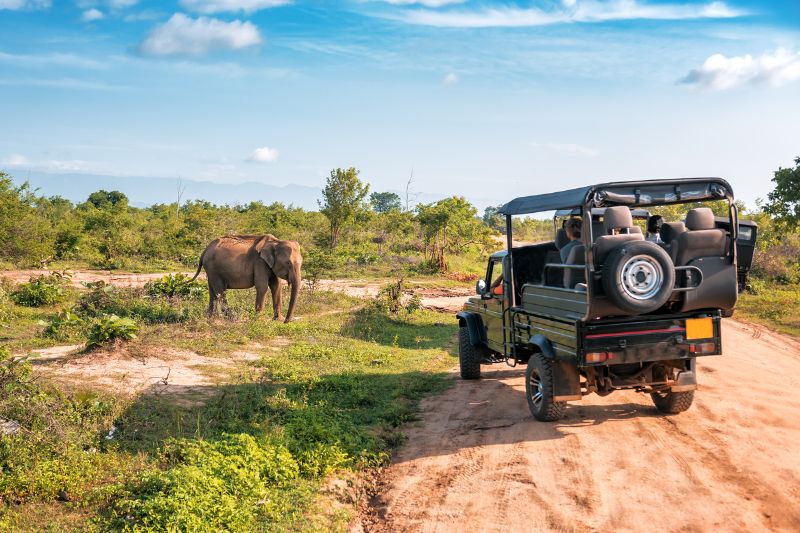
With keen eyes and deep knowledge of the area, guides can track and interpret animal behaviour, providing fascinating insights into the natural world. Game drives also offer the chance to witness the breathtaking beauty of the landscape, from sweeping savannahs to lush forests, and capture stunning photographs of the wild scenery. The thrill of the chase, the anticipation of a wildlife sighting, and the raw connection with nature make game drives an exhilarating and unforgettable safari experience.
Walking Safari
Walking safaris offer an unparalleled opportunity to intimately explore and connect with the natural world. Instead of observing wildlife from a vehicle, walking safaris allow travellers to step into the wild and experience the sights, sounds, and scents of the wilderness up close. Led by experienced and knowledgeable guides, walkers can learn about the intricacies of the ecosystem, from identifying animal tracks and signs to understanding the complex relationships between different species.
These safaris typically take place in smaller groups and are led by a guide who is well-versed in the local flora and fauna. Walking safaris can be tailored to suit different fitness levels, and participants can expect to encounter a variety of wildlife, from insects and birds to larger mammals such as elephants and lions.

Walking safaris also provide a deeper cultural immersion, as participants can interact with local communities and gain insights into their way of life. With every step, walkers can encounter unexpected moments of wonder, from spotting a hidden bird’s nest to encountering a herd of elephants at a waterhole. Walking safaris offer a truly authentic and immersive experience, allowing travellers to appreciate the beauty and diversity of nature in a more intimate and mindful way.
Hot Air Balloon Safari
For those looking for a truly unique experience, a hot air balloon safari may be just the thing. These safaris offer a bird’s-eye view of the landscape and wildlife below, providing a different perspective than a ground-based safari.
Hot air balloon safaris are typically conducted early in the morning when the air is calm and the wildlife is most active. As the balloon gently glides through the sky, adventurers can marvel at panoramic views of vast savannahs, rolling hills, or serene landscapes below. The elevated vantage point provides an unparalleled opportunity to capture breathtaking aerial photographs and witness the beauty of the wilderness from a completely different angle. The serene and peaceful experience of floating in a hot air balloon allows for a tranquil and immersive encounter with nature, devoid of the noise and disturbance of vehicles.

Wildlife sightings from the balloon are often unexpected and awe-inspiring, with the chance to spot animals from a distance without disturbing their natural behaviour. Hot air balloon safaris provide an unforgettable adventure that combines the thrill of soaring through the sky with the unparalleled beauty of the natural world, creating memories that will last a lifetime.
Photography Safari
Photography safaris offer a thrilling and immersive experience for nature and wildlife enthusiasts who want to capture the beauty of the natural world through their lenses. Embarking on a photography safari allows photographers to venture into stunning landscapes and remote wilderness areas, where they can capture unique and awe-inspiring shots of wildlife, landscapes, and cultural elements. With the guidance of expert wildlife guides and professional photographers, participants can learn valuable photography techniques, such as composition, lighting, and wildlife behaviour, to enhance their skills and capture stunning images.
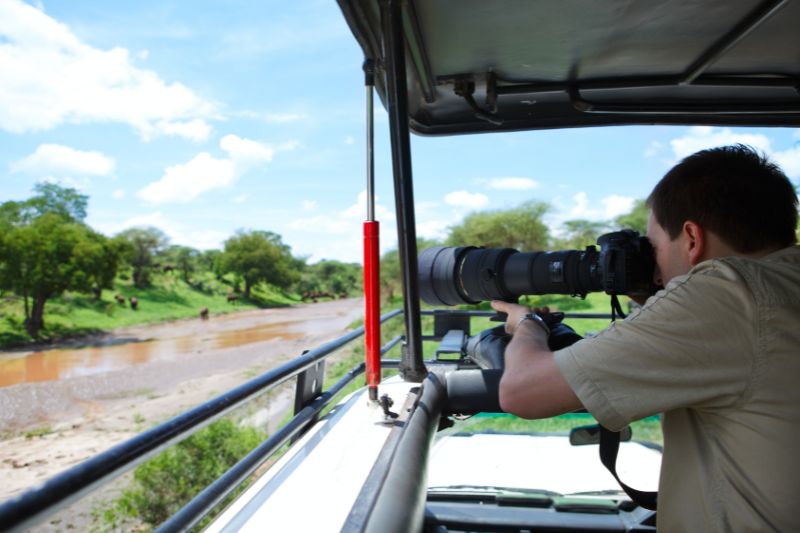
Photography safaris also provide opportunities to observe and photograph rare and elusive species in their natural habitats, creating unforgettable memories and remarkable photographs. Whether it’s tracking lions on the African savannah, photographing polar bears in the Arctic, or capturing the vibrant colours of a tropical rainforest, a photography safari is an extraordinary adventure that combines the thrill of wildlife encounters with the art of photography.
Boat Safari
Boat safaris offer a unique and immersive way to explore the diverse ecosystems and wildlife of rivers, lakes, and waterways. Cruising on a boat allows participants to access remote and untouched areas that may not be reachable by land, providing a different perspective and vantage point for wildlife viewing.
Boats make it possible to spot a wide range of wildlife, such as crocodiles, hippos, water birds, and even elephants and other animals that come to the water’s edge to drink. Guides with specialised knowledge about the local flora and fauna can provide insights and interesting facts about the ecosystem and its inhabitants. The tranquil rhythm of the boat and the serene surroundings create a calming and peaceful experience, perfect for enjoying the beauty of nature and capturing stunning photographs.
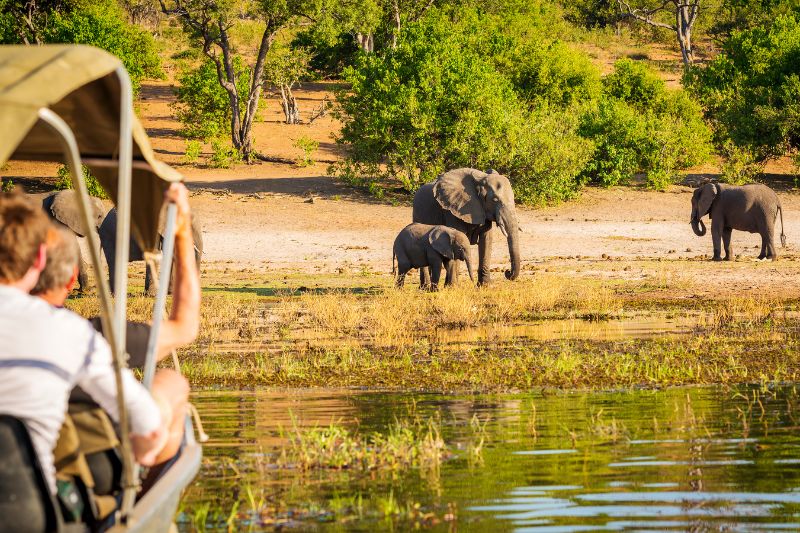
Whether it’s gliding through the winding channels of the Okavango Delta, exploring the mighty Amazon River, or cruising along the serene backwaters of Kerala, boat safaris offer a unique and unforgettable adventure for wildlife and nature enthusiasts alike.
No matter what type of safari you choose, it’s important to remember that these experiences are about more than just seeing animals. They are an opportunity to connect with nature, appreciate the beauty and diversity of our planet, and learn about the importance of conservation and sustainability.
Whether you’re a seasoned traveller or a first-time adventurer, a safari is an experience you won’t soon forget.
Anna is the founder of Really Wildlife. She's a 30-something lover of wildlife travel, vegetables and listening to the Lion King soundtrack on full blast.

What is safari?
Where did the word "safari" come from and what does it mean? How are safaris of the past different from the modern adventuring in Africa? Where to go for the best experience? All about this type of nature vacation - by safari fans and experts.
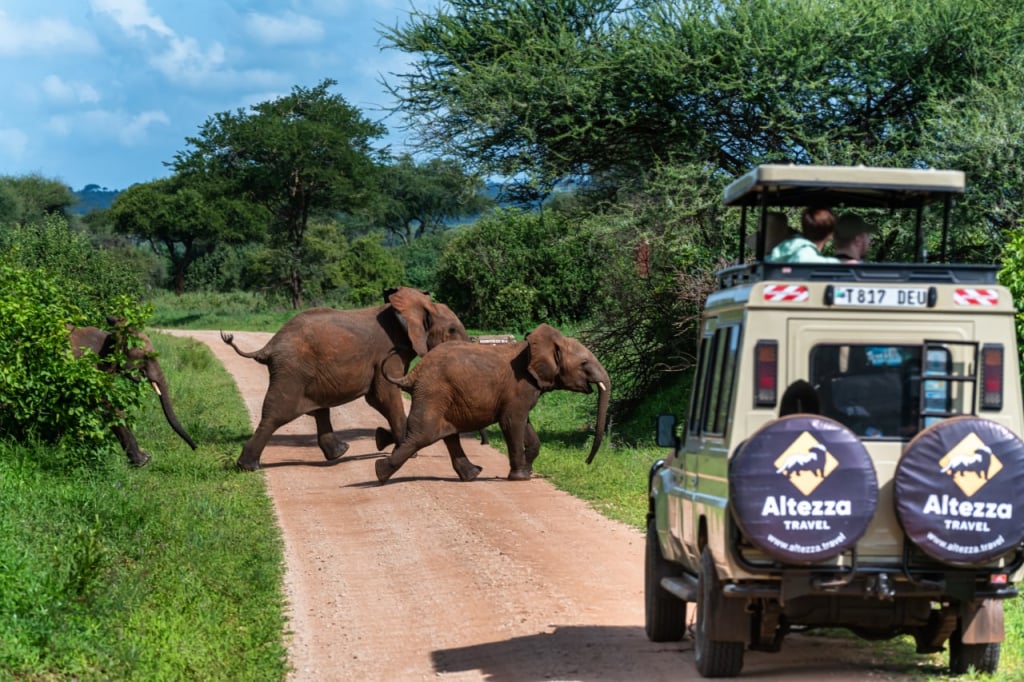
When we hear the word "safari," we imagine a group of tourists moving through an African savannah in search of large wild animals: lions, rhinos, buffalo, and elephants. In historical pictures, we often see men in pith helmets with guns in their hands, while modern pictures show people in SUVs holding long lens cameras. It is an animal hunt - hunting in the literal sense, or just observing and photo-hunting - in the vastness of the hottest continent. Fashion connoisseurs may also think of beige-colored clothing with a straight cut, the obligatory wide belt, and a wide brimmed hat, inherited from the British military who served in Britain's African colonies. All these are our first associations with the beautiful word "safari," which sounds like it could be an Arabic given name.
A modern-day safari is a sightseeing trip to an African national park, the main purpose of which is to observe wild animals. In the past, safaris were organized with the objective of hunting large animals. Africa's canonical Big Five: the elephant, lion, rhino, African buffalo, and leopard are associated with the hunting traditions of Africa. Among hunters, these five mammals were considered to be the most dangerous and difficult to pursue, and their body parts made the most coveted trophies.
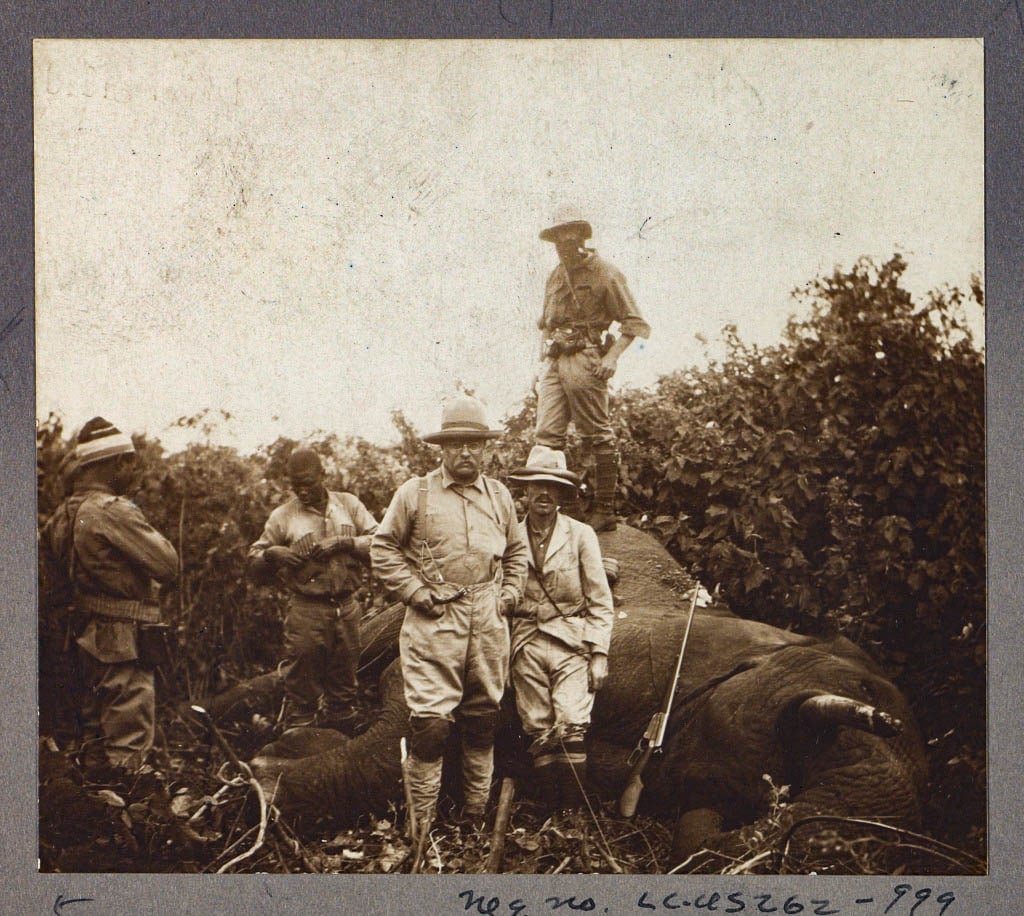
Nowadays, hunting on safari is generally condemned by modern society. Altezza Travel advocates for ethical treatment of animals, participates in projects to rescue and rehabilitate animals, strongly condemns hunting, poaching, commercial exploitation and other unacceptable forms of interaction with animals and nature, which humiliate, first of all, the human dignity. We do not organize hunting safaris, do not work in hunting reserves, do not cooperate with companies that exploit animals, and we urge our guests not to finance such organizations and not to participate in activities involving violence and unethical treatment of animals. However, it is still permitted in a very limited number of reserves. This very expensive pastime is strictly regulated by law. So, the vast majority of safaris today are rides on off-road vehicles that go along the routes designated by national parks, where you can meet wild animals, gaze at them up close or through binoculars, take pictures and observe their behavior in the natural environment.
The word "safari" itself comes from Swahili - the main language of the people of East Africa. It means "journey, trip" and goes back to the Arabic word “safar” with the same meaning. In Swahili-speaking countries, the term refers to any journey. There is even a common phrase, safari njema! It is a wish for a good and pleasant journey.
How has safari become a popular pastime?
The Oxford Dictionary defines “safari” as “a trip to see or hunt wild animals, especially in east or southern Africa”. In the West, this word was popularized by the British traveler Richard Francis Burton, who explored East Africa in the 19th century with John Henning Speke and took great pleasure in learning the languages and customs of the peoples he met. Gradually the word “safari” spread into other languages and was used to refer to travel in the wilds of East Africa.
By the way, Richard Burton became famous not only as a linguist and ethnographer but also as a person who translated into English the ancient Indian Kamasutra as well as the Arabic and Persian tales of the Thousand and One Nights. Moreover, he was a rare non-Muslim pilgrim to Mecca and had to disguise himself as a sheikh or a dervish to secretly make those pilgrimages. Burton is also famous as the first European to discover the great African Lake Tanganyika, which stunned him with its beauty.
One of the most well-known historical African safari trips was the long expedition embarked upon by the 26th U.S. President Theodore Roosevelt. In 1909 he went to Africa The Smithsonian–Roosevelt African Expedition took Roosevelt from 1909 to 1910 through what is now the territories of Kenya, Uganda, the Democratic Republic of Congo, and Sudan. with his son and a large escort team for almost a year, just after his presidential term ended. Photos of Roosevelt on the hunt were printed in the newspapers, and a documentary about the trip was shown immediately upon his return. There is a book report of African Game Trails written by Roosevelt himself. We may be struck today by the list of animals killed on that safari, which is scrupulously given in the book. But the expedition was equipped by the Smithsonian Institution and allegedly had scientific motivations behind it.

The expedition brought back from Africa more than 23,000 specimens of plants and animals. It is recorded that 512 large animals have been shot personally by the president and his son, and a total of about 11,400 animals were killed or captured. It took the Institute eight years to catalog all the specimens. They became the basis of today's National Museum of Natural History in Washington. Therein lay the contradiction in Theodore Roosevelt's personality: his passion for hunting was joined with his desire to champion the interests of conservationists and scientists. It was he who founded the U.S. Forest Service. Roosevelt was also the first president to establish national parks and numerous protected areas in the United States.
"Roosevelt in Africa" documentary. Filmed in 1909. Library of Congress archives
Safari as a popular cultural phenomenon was heavily influenced by the American journalist and writer Ernest Hemingway. In the 1930s he traveled through Kenya and Tanganyika (as the mainland territory of present-day Tanzania used to be called). It is known that Hemingway was impressed by Africa’s stunning nature as well as by the magnificent Mount Kilimanjaro. Hunting was one of his passions - he hunted a lot in the Serengeti, as well as near Lake Manyara and today's Tarangire National Park. His love of nature and hunting influenced Patrick, the writer's son, who had been traveling with his parents since childhood. Patrick Hemingway eventually moved to Tanzania and lived there for 25 years. He also worked in Uganda and Kenya and even started his own safari business.
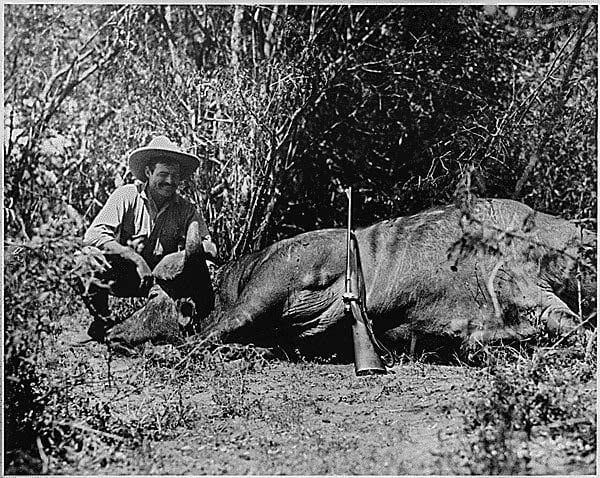
Ernest Hemingway's best-known "African" works are the short story "The Snows of Kilimanjaro '', and the "Green Hills of Africa" novella, which essentially is an autobiographical report of his family’s safari travels. His other drafts about Africa were compiled into the “True at First Light” book and published after the writer’s death by Patrick Hemingway.
Adventure novels on the topic of safari started to appear as early as the 19th century. We can remember the classic Jules Verne’s first novel, “Five Weeks in a Balloon”, which was about a journey in the air over Africa. We may also think of a popular novel by Henry Haggard, called “King Solomon's Mines”, about adventures in South Africa, or of the “World Voyage of a Young Parisian” by Louis Boussenard.
Another genre of literature that has preserved many early safari stories was adventure diary entries. Here one may think of William Kingston's “Adventures in Africa by an African Trader”. Allegedly those entries were written by a real but unidentified ivory trader and Kingston used those writings to compile a book. Another notable work of this genre was “Trader Horn: A Young Man's Astounding Adventures in 19th Century Equatorial Africa”, written by another ivory trader, Alfred Horne. Back then many parts of Africa remained unknown to Europeans, and such books fuelled the public interest in the exploration of the African continent with its incredibly rich geographical, cultural, and biological diversity.
The age of cinematography began in the early 20th century, and there were many popular adventure films set in Africa (most often in East or Central Africa) that also added interest to the topic of safari. The above-mentioned “Trader Horn” was adapted in 1931, although greatly augmented by fictional events. In the mid-20th century, the theme of jungle adventure was popular, and on cinema screens, you could see the African expanses being added alongside such locations as the jungles of Southeast Asia and the Amazon. Later, the 1985 film "Out of Africa'' starring Robert Redford and Meryl Streep had a major influence on the return to fashion of the safari style in clothing and interior design. It was based on the autobiographical book by Karen Blixen, who lived for many years in Kenya, and won seven Academy Awards and three Golden Globes, among other honors.
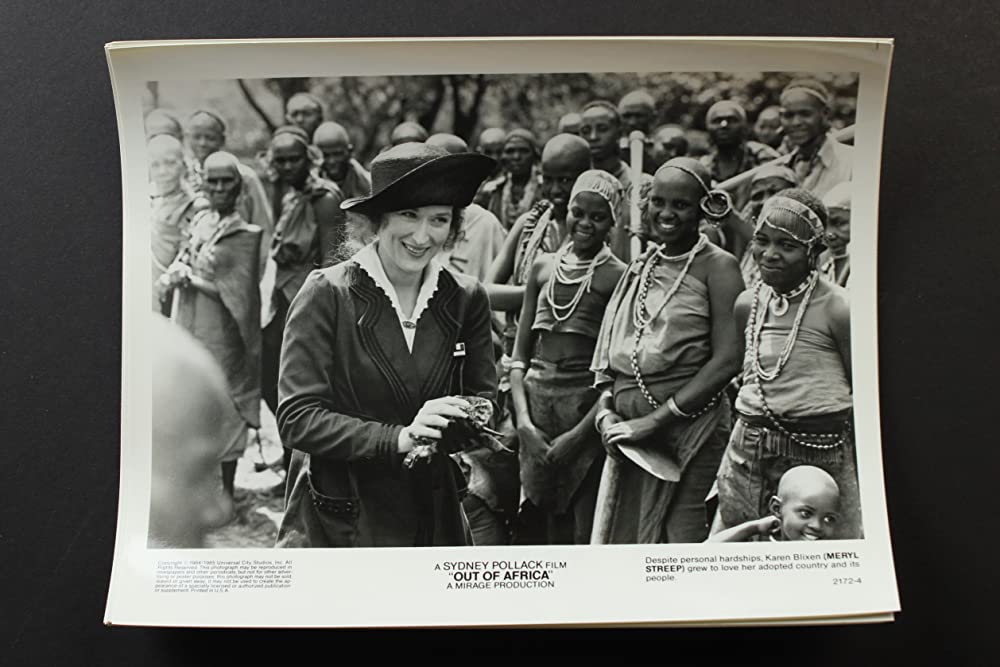
The growing interest in the modern type of safari travel was promoted even further by numerous documentaries, such as those from the National Geographic and Discovery channels, filmed in East African national parks, most notably in the Serengeti. Scenes of people driving through the savannah in an open car and observing various wild animals in their natural habitats while taking photos have encouraged many to plan their personal adventure - a trip to the great natural reserves of East Africa. Many travelers are also pleasantly surprised to find out that apart from driving in a car, there are numerous other ways of visiting the wild places of Africa.
What kinds of safaris are there?
A classic safari in today’s East Africa is a trip in an off-road vehicle with a driver-guide through the expanse of a national park where wild animals live in their natural habitats. The forests and savannas are roamed by herds of elephants, buffalo, zebras, and antelope of different species, as well as by giraffes which wander alone or in small groups. The trees are often occupied by monkeys and birds, while warthogs hide in the shade of bushes. Large herbivores are hunted by lion prides and solitary carnivores such as leopards and cheetahs. Jackals and hyenas choose smaller victims. Hippos and crocodiles hide in rivers from the heat. Travellers who go on safari have a unique opportunity to observe all those spectacular environments that are teeming with life.
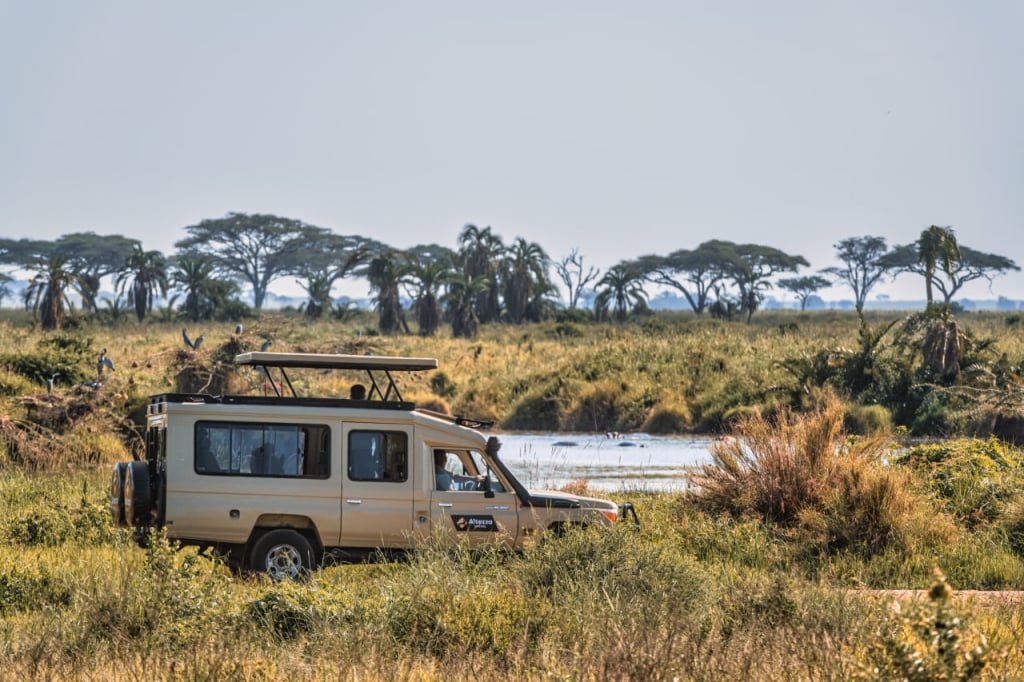
What are the advantages of driving around a national park in a car? This allows you to see a large number of animals of different species in just 2-3 hours. Also, when rangers find an interesting sighting such as a large pride of lions or a rhinoceros, they report it to the safari car driver by radio, so that you can quickly go there and see those animals. The off-road vehicle ride is the most popular safari format, but it is not the only one.
In some parks, where safety conditions allow, you can go on safari afoot. This is usually arranged in the areas where attacks by large animals are unlikely and there are no large herds grazing. For further safety, visitors are accompanied by an armed ranger. Safari walks allow you to get as close as possible to the natural environment of the park, observe the local plant world, and explore nature by encountering it directly.
One of the most beautiful and unusual ways to go on safari in Africa is to fly over the savannah in a hot air balloon. This will guarantee a thrilling experience for any visitors to a national park. Flying in the basket of a hot air balloon will allow you to marvel at the vastness of the landscapes below, and feel the true spirit of adventure captured in the pre-industrial era novels and travel diaries. Modern aerial safari is a premium type of recreation, which costs more than the classic car tours but guarantees amazing emotions and unusual angles from the bird's-eye view. A hot air balloon experience is often added as a "highlight" to a regular game-drive safari.
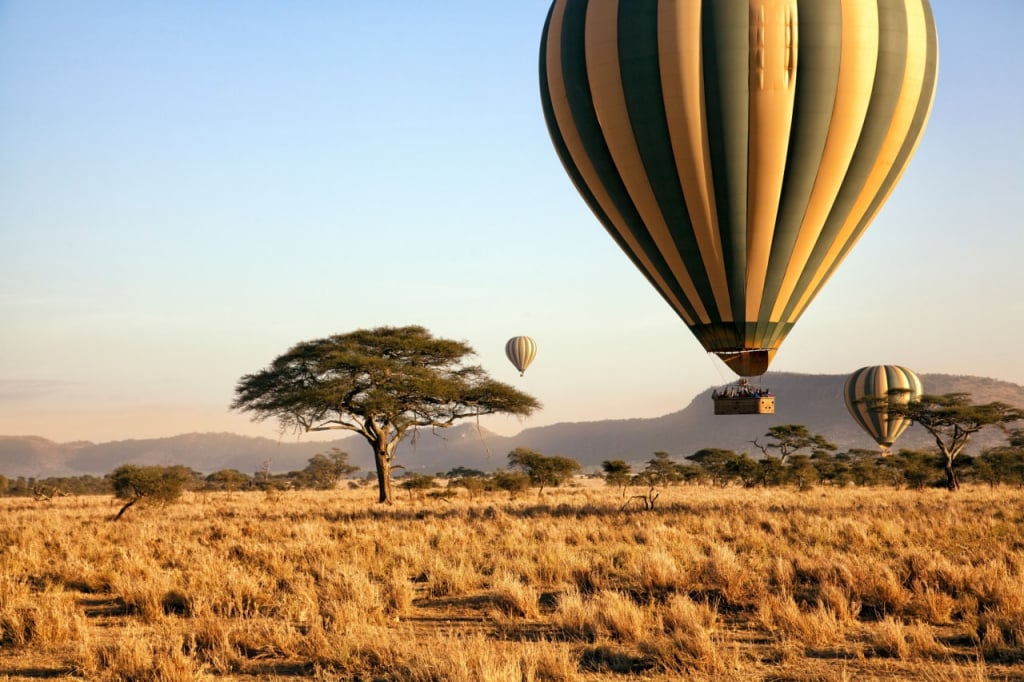
Another fantastic way to look at Africa’s stunning nature from an unfamiliar angle is by traveling on a boat over the surface of lakes, rivers, or even in the ocean. Riding a boat along one of the Tanzanian rivers, you will hear the guide telling you all sorts of interesting facts about crocodiles and hippos. And, of course, you’ll have a chance to observe those magnificent animals in close proximity! On a sea safari, you can go to various islands or ride a boat near the mainland. One of the highlights of a sea safari is getting close to dolphins and observing how those aquatic mammals play.
Where can you go on safari?
Perhaps the most famous destination for those wishing to go on a safari tour is the Serengeti National Park in East Africa. Many consider the iconic landscapes of the Serengeti to be the birthplace of the safari phenomenon. It is located in northern Tanzania. A natural extension of this national park can be found in neighboring Kenya, where it is called Maasai Mara National Reserve.
Another world-famous protected area can be found nearby: the Ngorongoro Conservation Area. It contains the world's largest ancient caldera which is truly a unique and breathtaking site. The famous zoologist Bernard Grzimek in his book “Serengeti Shall Not Die” called it a huge natural zoo. It is home to the “Big Five” game (elephant, lion, leopard, buffalo, rhino) and huge migrating herds of herbivore animals. The caldera’s steep walls make it seem like the animals are surrounded by a sort of natural enclosure.
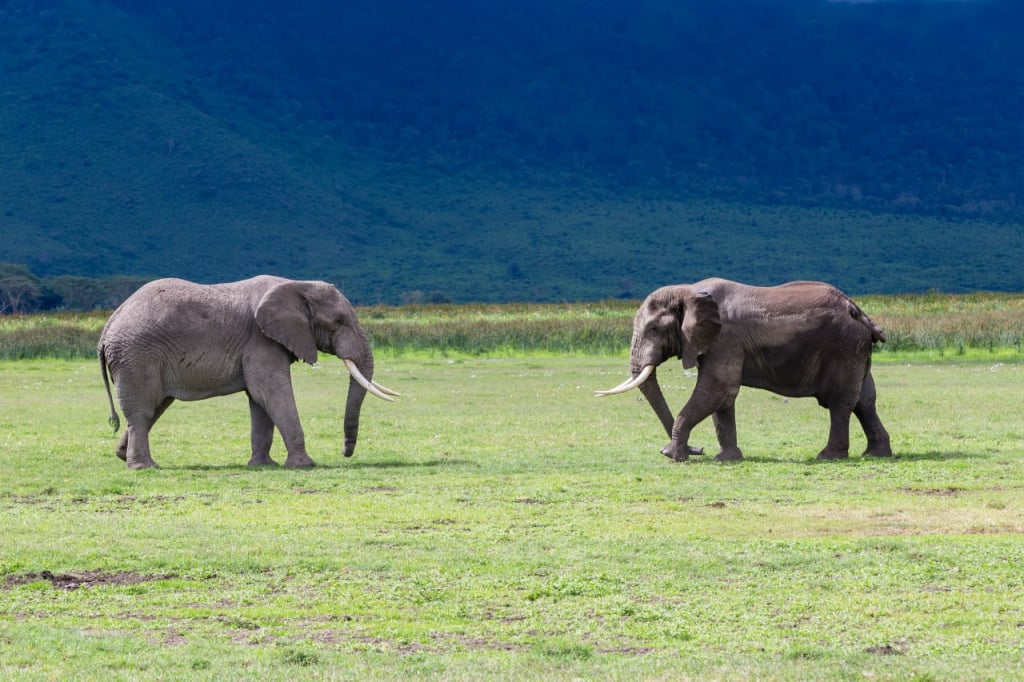
Other notable parks and protected areas include Kenya's Amboseli and the Laikipia Plateau, Kruger National Park in South Africa, the Okavango Delta and Chobe National Park in Botswana, as well as Queen Elizabeth National Park in Uganda, among others. And we can also mention the famous national park in Zambia, Mosi-Oa-Tunya, and Zimbabwe's Victoria Falls National Park. While these two national parks aren’t large, their main advantage is that both are adjacent to the spectacular Victoria Falls. Another remarkable place that can compete with Victoria Falls in popularity is the renowned Mt. Kilimanjaro volcano, whose international fame helped to bring popularity to some less well-known Tanzanian national parks such as Arusha and Tarangire.
There are many more notable national parks in other countries of the continent. Safari has long spread beyond East Africa. Moreover, the name “safari” is frequently attached to tours in national parks of Asia, primarily in India, Nepal, Bhutan, and Sri Lanka. In India, for example, Ranthambore, Gir forest, and Kanha national parks are popular. The latter is considered to be the inspiration behind the Rudyard Kipling's “Jungle Book”, which is a story about an animal-raised boy named Mowgli. Generally, these days safari has become a global phenomenon. It is often used to name a journey into the wilderness anywhere in the world, even if it is in Australia.
Starting from the 1960s, so-called “safari parks” started to appear in different countries. Those are basically open-air zoos, where animals live in relatively large open areas. Visitors could enter such territories in their own cars or even on foot. Such experimental “zoos” first began in the U.S. and then in Japan, where you could ride past walking lions.
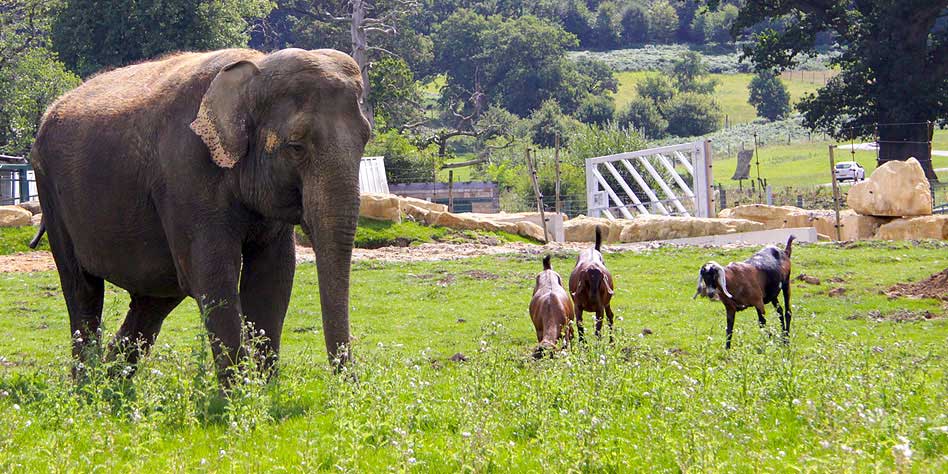
The first full-fledged safari park was Longleat Safari and Adventure Park in England. Today in that well-known place you can find ostriches, giraffes, antelopes, zebras, and other animals, not only those native to Africa. In the 21st century, there is a huge number of such safari parks around the world. The better places, such as Longleat, often invest in conservation, as well as rescue and rehabilitate animals, for example, those who spend their lives in the circus, like Anne the elephant mentioned above. But, of course, many parks are much worse and they can never be the same as the natural environment. The animals there are kept in captivity and frequently isolated, and some of those parks adopt the practices of contact zoos, which many consider unethical and harmful for the animals.
Real safari without violence towards animals can be found where it once originated - in Eastern Africa. Here animals live and thrive in their native environment without people trying to move them to other continents and intrude on their lives. Tanzania has made great progress in establishing national parks and reserves with clear rules and regulations for the visits into those protected areas, which helps to protect the country’s spectacular conservation areas. This, coupled with Tanzania’s outstanding biodiversity and natural beauty, makes it one of the best countries for safari tourism, if not the best in all of Africa.
If we search Instagram for hashtags and geotags with the word "safari" and then analyze the stats, we’ll see that there are three African countries in the top 10: Tanzania, South Africa, and Kenya. The first place is taken by the Victoria Falls National Park, where the main attraction is, of course, the spectacular waterfalls. But among true safari destinations, pictures from the Serengeti National Park are the most “Instagrammed” with over 160.000 photos tagged. All in all, Tanzania appears to be the clear leader when it comes to wildlife safari adventures.
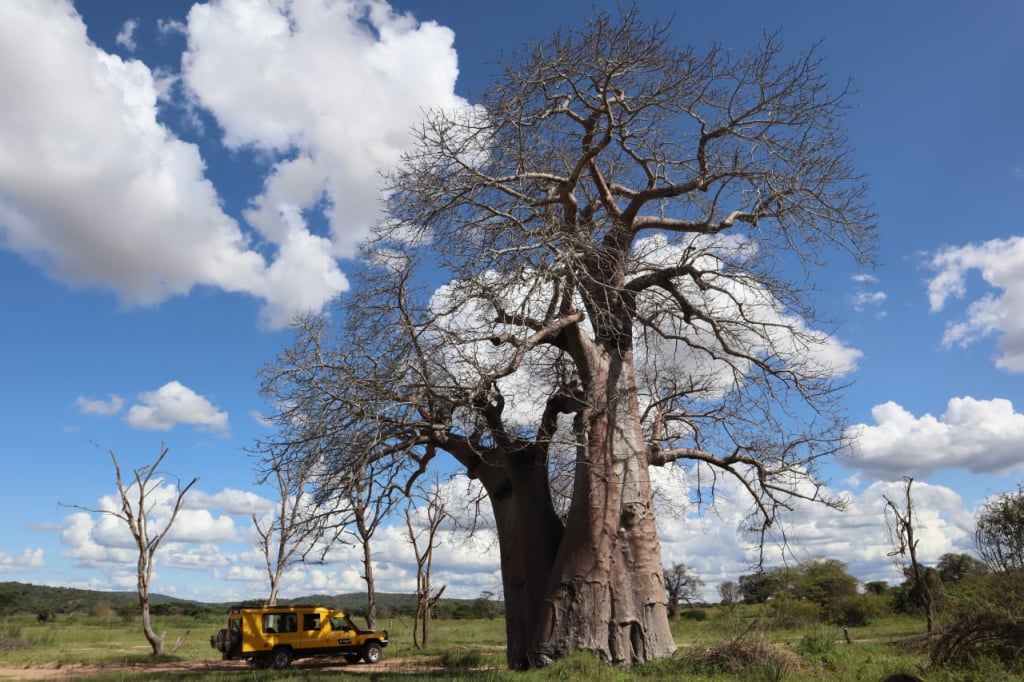
Active development of tourism in the country, high level of security, as well as availability of many other tourist activities can make your trip to Tanzania delightful, safe, and truly memorable. In addition to going on safari, you can learn about the folk traditions and culture of the local tribes in their villages, take tours to lakes, waterfalls, and other places of natural beauty, as well as explore or relax on the beaches of Zanzibar and other islands. Also, you could go to the diving sites off the coast in the Indian Ocean and observe underwater life with your own eyes. And, of course, there are expeditions to Mt. Kilimanjaro. By combining safaris with a variety of other activities, you can build a plan for the perfect African vacation while staying in the same country.
Welcome to the birthplace of safari - Tanzania, East Africa
The most popular protected areas in Tanzania are located in the north of the country, between Lake Victoria and Mount Kilimanjaro. We have already named them: Serengeti, Ngorongoro, Tarangire, Arusha, and Kilimanjaro National Park itself, whose main attraction is the eponymous peak, the highest in Africa. In addition to the Kilimanjaro trek, the north of Tanzania can offer guests two more interesting climbs - to the top of Kilimanjaro’s little brother, Meru volcano, and to Ol Doinyo Lengai, which is considered to be a sacred mountain among the local tribes. Among famous sites nearby there are also Lake Manyara National Park and three major lakes: Manyara, Eyasi, and Natron.
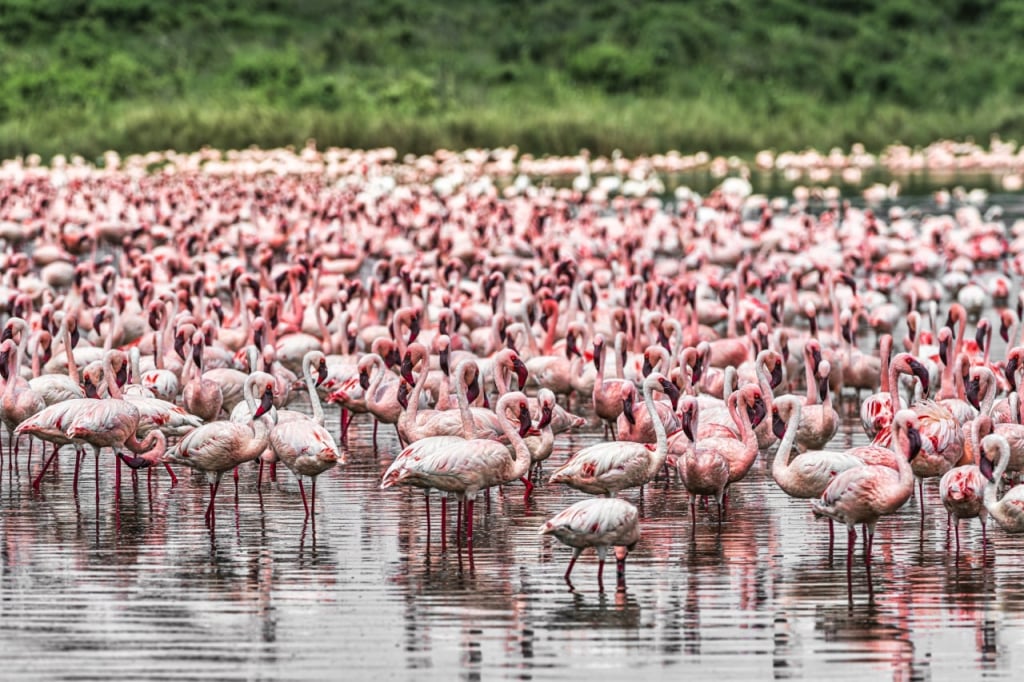
We have long specialized in the organization of nature tours in Tanzania and know all about local safaris. This is why we can confidently say that the incredibly rich travel opportunities of this African country are not limited to the most famous national parks we mentioned above. In the west of Tanzania, as well as in its central and southern parts, there are national parks and reserves that deserve attention. We can especially note Ruaha, Nyerere as part of the Selous, Katavi, as well as Gombe Stream, and Mahale Mountains, among other national parks and reserves.
How much time does going on safari take?
If you plan your trip to Tanzania well, you can ensure a great safari experience in several days, visiting the savannah expanse of the Serengeti with its Great Animal Migration, the famous Ngorongoro crater, as well as the wilderness of Tarangire, where herds of elephants roam among baobabs, the Great Ruaha River, in the waters of which many crocodiles and hippos hide, and the dense forest parks on the coast of Tanganyika, where researchers have spent decades observing chimpanzees.
A good safari trip would take several days. If you can dedicate a couple of weeks or more to your adventure - even better! Every major national park is absolutely worth spending a few days in, and sleeping in lodges A lodge is a hotel in Africa usually located in a wildlife area. Staying in such a place, you can feel closer to nature, and have much more convenient access to safari trips. Most often it is a complex of several houses for guests, which can either be solid buildings or comfortable structures with tent walls. As a rule, at the centre of this complex there is a restaurant which will provide excellent meals for you. The most comfortable lodges are located inside national parks, or nearby. Essentially, lodges are eco-hotels that always have high standards of service and of accommodation facilities. Some of them reach the level of 5 stars. right on the park’s grounds is a great experience. In that case, you’ll have the opportunity to go on safari in the early morning, and in the evening just before sunset. During these periods, the animals are the most active and playful. The majority of interesting scenes of animals interacting with each other usually take place in the morning and evening hours, when they aren’t forced to lazily seek shelter in the shade to avoid the scorching sun.
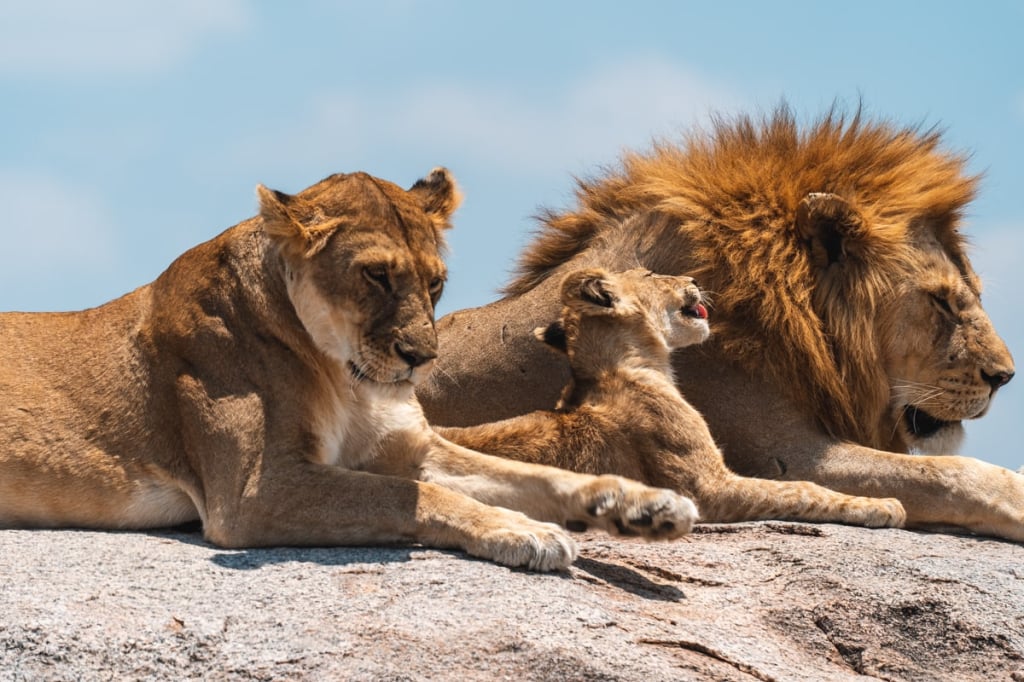
The incredible diversity of Tanzania’s flora and fauna allows for a variety of experiences. If you have the opportunity to stay on safari for longer than two weeks, don't miss that chance. Theodore Roosevelt spent almost a year in Africa, Ernest Hemingway came twice, and each time it was an extended trip.
All I wanted to do now was get back to Africa. We had not left it yet, but when I would wake in the night, I would lie, listening, homesick for it already.
Ernest Hemingway, “Green Hills of Africa”
What to expect from your safari trip in Tanzania?
There are three elements to a safari trip: safari vehicle rides, rest at one of the nearby hotels, and transfers between the hotel and the national park. Good planning allows you to minimize transfer time so that you will have more time to enjoy the main activities or rest.
Typically, it’s a good idea to stay within the same park for at least three days, ideally five days. This way you can experience the best things a park has to offer, visiting the interesting places that are often missed by hurried tourists.
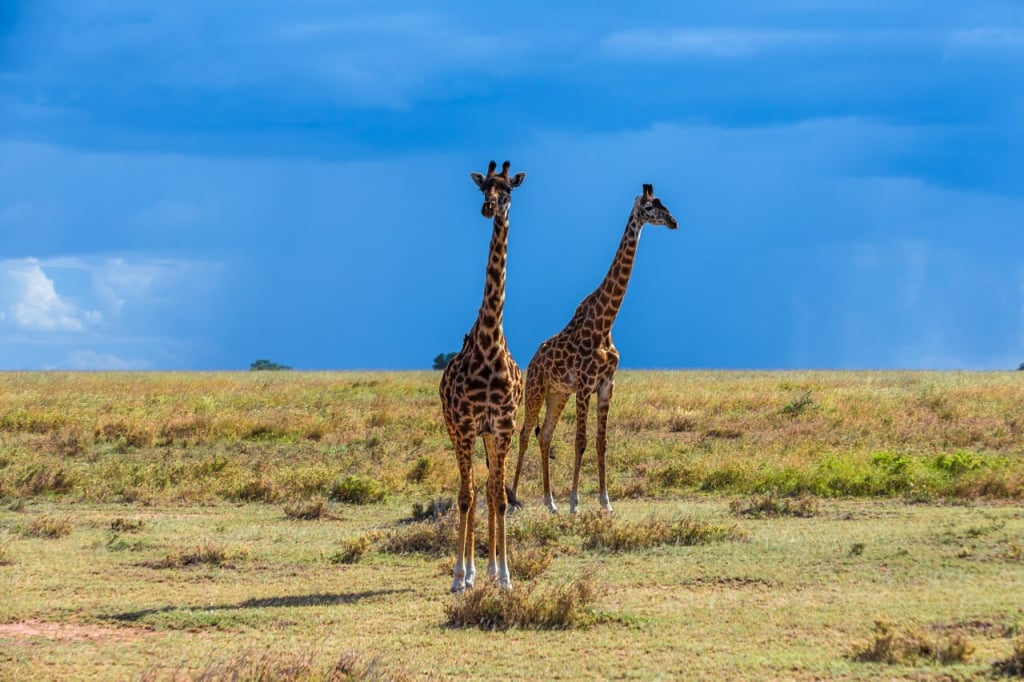
When choosing hotels, we strongly recommend that you pay attention not so much to the number of stars or interior details, but to the specific conditions you’re looking for in your accommodation. A very important factor is the hotel’s location. A lodge located within a national park often wins even against a luxury hotel in the nearest town. Time spent in transfer should be kept to a minimum, this will allow you to experience more of Tanzania’s spectacular nature. The opportunity to be deep in the park in the hours of the early morning is priceless! And the overall impression at the end of the safari is made up of these individual episodes.
An ideal safari day can be described as follows: the guests wake up early, shower, and take a safari vehicle to the park, taking their lunchboxes with them. This way it’s possible to see the morning predator hunt and lots of animals standing or laying down right on the road or nearby (before dozens of other safari vehicles have arrived). Shortly after that visitors can enjoy an outdoor breakfast at one of the park's picnic sites. Later, they ride some more around the park and return to the lodge for lunch. After lunch, the guests rest in the cool rooms while it is hot outside, and in the afternoon they go on safari again. Again they see many different animals, take beautiful pictures and return to the lodge as it is getting dark. In the evening they enjoy a delicious dinner, cozy outdoor gatherings, and a nice rest before going to bed.
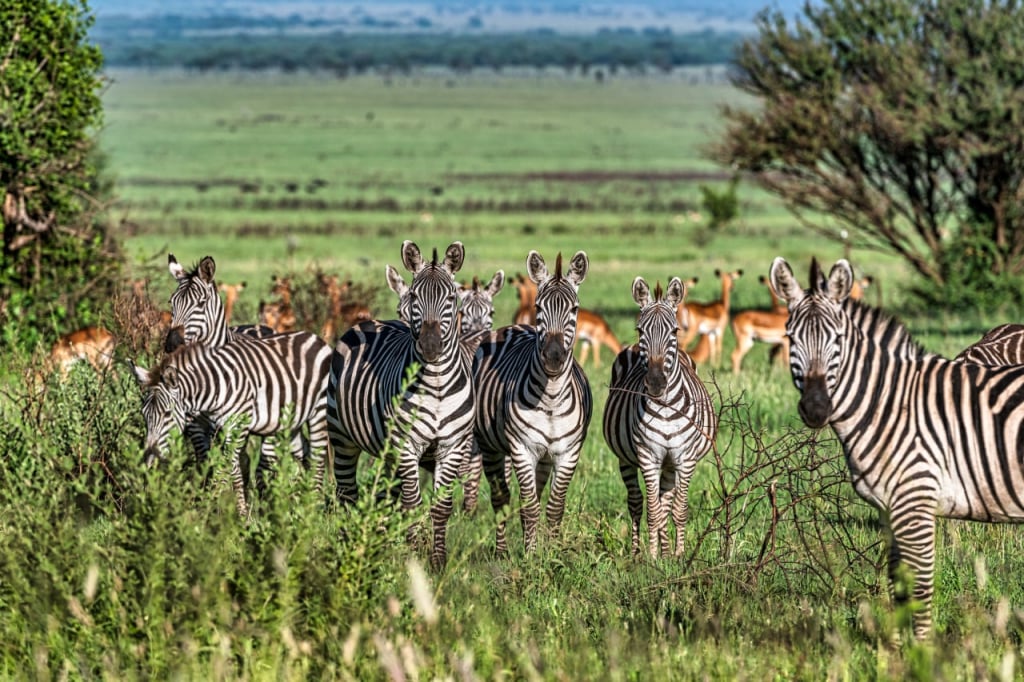
When is the best time to go on safari?
Tanzania is amazing because it is located near the equator and has several geographic regions. This means that you can travel here at any time of the year, as long as you don't set a specific goal, such as seeing antelopes forcing the rivers of Serengeti, which falls on June-August, during the Great Migration. However, Tanzania’s climate and weather conditions allow you to observe animal life almost all year round.
If you are worried about the rainy seasons, let us reassure you - the seasonality of rainy and dry periods in Tanzania these days is rather arbitrary. In any case, some rain very rarely prevents our guests from enjoying a safari. In addition, the so-called rainy season has many advantages, the key ones being the absence of crowds of tourists on popular trails in the parks, and lower hotel prices.
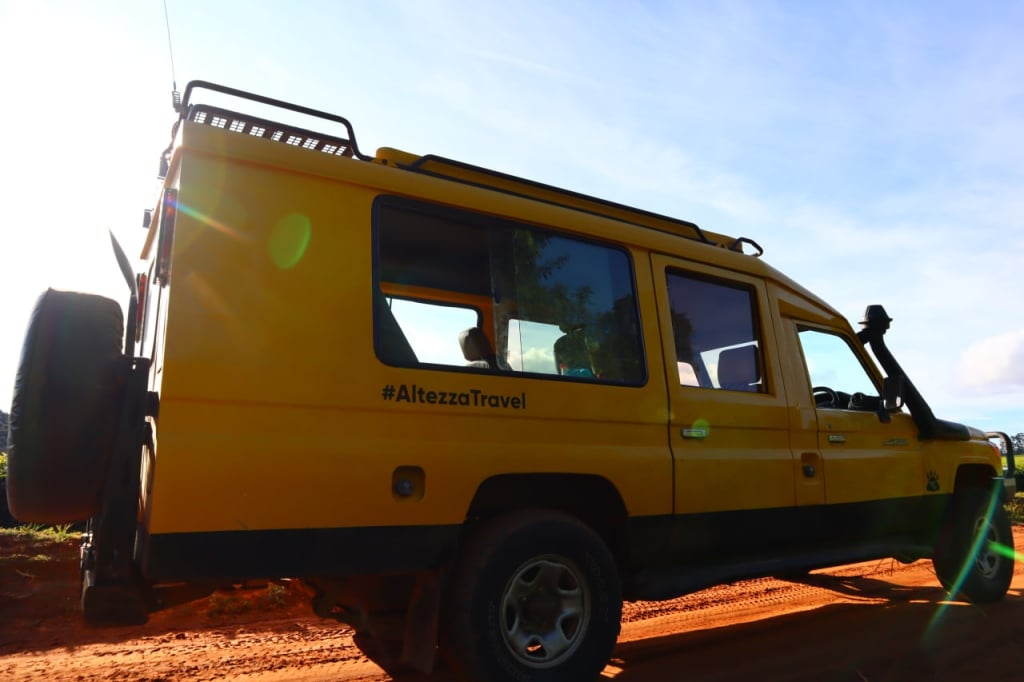
If you can't wait to start planning your safari trip to the heart of Africa, check out Altezza Travel's safari programs. While we offer numerous different tours, a customized program can be even better. Just contact our managers and ask them to put together a program that will be the most suitable for you. A couple of short articles with practical tips may also be helpful: on how to prepare for a safari in Tanzania, and what to bring with you on your trip.
Don't hesitate to ask questions, and feel free to ask us to expand your safari tour program - Tanzania has a lot to offer. We look forward to seeing you on safari!

Valentina, a creative artist with Altezza Travel, draws inspiration from Africa's natural wonders, dividing her time between Tanzania and South Africa. With over 8 years of living across various African regions, she offers invaluable insights and practical travel tips on our blog for those eager to explore this remarkable continent. Having immersed herself in numerous cities, towns, and villages, Valentina has a rich knowledge of African culture, community, and life.
Is there any age limit on safari? My son will be 6 this year
Hi Sandi! You question has inspired us to write a detailed article about it!
To give you a short answer:
1.There are no age limits set by the National Parks.
2. Some lodges and camps have age restrictions, some not accepting children under 5 years old.
3. Ultimately, it depends on your child. Even 3-year-olds can enjoy a safari, while a 14-year-old teenager might be bored and spend all their time on their smartphone. It all depends on the child's behavior. There are even a lot of adults who aren't interested in wildlife. However, we believe that taking kids on an African safari can really spark their interest in wildlife and exploration. Just keep in mind that safaris involve dust, rough roads, and hot sun.
We've had many families go on safari with their kids and they've enjoyed every single day in Tanzania. It's really like the Lion King movie - kids will see elephants, giraffes, zebras from a very short distance from the car - they will definitely fall in love.
- Cambridge Dictionary +Plus
Meaning of safari in English
Your browser doesn't support HTML5 audio
- air corridor
- amenity kit
- caravanning
- high season
- phrase book
- post-holiday
- put something up
- ranger station
- tourist trap
- trailer park
You can also find related words, phrases, and synonyms in the topics:
safari | American Dictionary
Examples of safari, translations of safari.
Get a quick, free translation!

Word of the Day
one-hit wonder
a performer of popular music who makes one successful recording but then no others

A finger in every pie: phrases with the word ‘finger’

Learn more with +Plus
- Recent and Recommended {{#preferredDictionaries}} {{name}} {{/preferredDictionaries}}
- Definitions Clear explanations of natural written and spoken English English Learner’s Dictionary Essential British English Essential American English
- Grammar and thesaurus Usage explanations of natural written and spoken English Grammar Thesaurus
- Pronunciation British and American pronunciations with audio English Pronunciation
- English–Chinese (Simplified) Chinese (Simplified)–English
- English–Chinese (Traditional) Chinese (Traditional)–English
- English–Dutch Dutch–English
- English–French French–English
- English–German German–English
- English–Indonesian Indonesian–English
- English–Italian Italian–English
- English–Japanese Japanese–English
- English–Norwegian Norwegian–English
- English–Polish Polish–English
- English–Portuguese Portuguese–English
- English–Spanish Spanish–English
- English–Swedish Swedish–English
- Dictionary +Plus Word Lists
- English Noun
- American Noun
- Translations
- All translations
To add safari to a word list please sign up or log in.
Add safari to one of your lists below, or create a new one.
{{message}}
Something went wrong.
There was a problem sending your report.

- Find Your Tour
- Heavy Discount
- Enquire / Contact Us
- Send an Inquiry
- Map of Africa
- Contact Details
- African Safari Cost
- Travel Insurance
- Custom Safaris
- All Budget Safaris
- Africa Camping Safaris
- African Safaris for Seniors
- Exclusive Small Group Camping Safaris
- Gorilla Trekking Safaris & Tours
- Lodge Safaris
- Short Stay Tours
- All Overland Tours
- Camping Overland Tours
- Exclusive Overland Safaris
- Lodge Africa Overland Tours
- All Family Safaris
- Family Camping Safaris
- Family Lodge Safaris
- Family Safaris in East Africa
- Family Safaris in Southern Africa
- All Adventure Travel
- Great White Shark Diving
- Walking Safaris & Hiking Tours
- Chobe National Park
- Etosha National Park
- Kilimanjaro
- Kruger National Park
- Ngorongoro Crater
- Okavango Delta
- Sabi Sands Game Reserve
- Serengeti National Park
- South Luangwa National Park
- The Garden Route
- Victoria Falls
- Zanzibar Island
- Masai Mara Conservancies
- Namib Desert
- Pilanesberg National Park
- South Africa
- Kingdom of eSwatini
- Dar es Salaam
- Johannesburg
- Livingstone
- Antananarivo
- Adventure Travel & Activities
- Africa Beaches & Islands
- African Animals & Conservation
- African Culture
- Best Things to Do
- Big 5 Safari
- Bucket List Ideas
- Family Safari
- Overland Africa & Budget Safaris
- Places in Africa
- Safari Costs & Budgeting
- Travel Tips & Planning
- Where to See
- Botswana (Okavango Delta +)
- Cape Town + Garden Route
- East Africa
- Kenya (Masai Mara +)
- Kruger + Sabi Sands
- Morocco + Ethiopia
- Namibia (Etosha +)
- Rwanda + Uganda
- South Africa, Lesotho + Eswatini
- Southern Africa
- Tanzania (Zanzibar, Serengeti +)
- Zambia, Zimbabwe + Malawi
- Safari Costs
- Client Reviews

What is a safari and what’s a wildlife safari in Africa like nowadays?
Of course, you've heard about African safaris and seen photos of celebs looking glamorous on safari in Africa. But, what is a safari really? And what is a wildlife safari in Africa like for the regular 21st-century traveller?
Here, we'll tell you all about African safaris and explain what a wildlife safari in Africa is like for most travellers nowadays. By the end of this post, you'll know what to expect on a wildlife safari in Africa today.
What is a safari?
A safari is a journey.
In the broadest sense, to go on safari is simply to travel . More specifically, a safari is a journey that involves going into nature to watch wild animals.

The roots of the word safari are Arabic (and later Swahili), but the modern concept of safari originated in Africa. Today safari is synonymous with Africa.
Can you only safari in Africa or can you go on safari outside of Africa?
Yes, safari is an African thing. Although you can go on a safari-style trip in places outside of Africa, safaris are essentially African.
Africa is the home of the safari. This is where the classical idea of the wildlife safari was born and evolved. The safari is firmly rooted in Africa.

That said, you can go on 'safari' in Australia, India, Canada, the United States, and other countries. Of course, there are wilderness areas where you can see wild animals, all over the world. But, none of the wild places outside of Africa are quintessential safari territory. Elsewhere you find wildlife expeditions or wildlife tours (safari-style trips).
You can take trips into the wilderness anywhere, but you can only truly go on safari in Africa.
What is a safari in Africa, then?
A safari is the most famous and sought-after type of holiday in Africa. Going on safari is widely considered the ultimate 'thing to do' in Africa. Usually, a safari in Africa implies a wildlife safari.
In essence, an African safari is any journey into the wilderness to observe free-roaming wildlife.
This traditional definition of a safari in Africa has expanded over time, however. Nowadays any trip in Africa where you spend some time in nature looking at free-roaming animals can be called a safari.

In summary, a safari is a journey (or expedition) to look at wild animals, especially in East Africa and southern Africa.
A safari in Africa is not...
A wildlife safari in Africa is not a trip reserved for khaki-clad bushwhackers and experienced game rangers or scientists. You don't have to be an outdoorsman like Bear Grylls to love your time on safari. Just about anyone can thoroughly enjoy an African safari in the travel style that suits them best.

A safari is not the same as a tour of a wildlife sanctuary or animal rescue centre. Even in Africa, visits to wildlife havens or shelters are not safaris.
A trip to an African zoo is not a safari. A wine-tasting tour in the Cape Winelands is not a safari. A township tour? No. A trip to meet the Omo Valley tribes in Ethiopia? Technically, not a safari. A road trip in Namibia? Also, strictly speaking not a safari - unless you visit a game park with wildlife, like Etosha.
An African safari is still different from a city holiday, beach vacation, historical tour, or cultural trip in Africa.
In Africa, a holiday only becomes a safari when you add an element of wildlife watching in nature. Be it game viewing by 4x4 safari vehicle, boat, canoe, small plane, or on foot, to name a few. Based on this broader definition of safari, boat trips and marine tours are often classed as 'ocean safaris'.

First, let's take a look at the traditional African safari and how it has evolved...
What does the word safari mean? (the origins of safari)
The word 'safari' originates from the Arabic word 'safara' which means 'a journey'. The Arabic word was later adopted by the Swahili of East Africa and adapted to become the Swahili word 'safariya' which means 'journey' or 'kusafiri' which means 'to travel'.
The English word 'safari' originates from the late 19th century. The word 'safari' was introduced into the English language as a foreign language word in 1858 and later adopted as an English word. It is said that the word 'safari' was introduced into the English language in 1860 by the legendary British explorer, Sir Richard Francis Burton. Then, in 1890 the English word 'safari' was added to dictionaries according to the Online Etymology Dictionary .
Today, traditional dictionary definitions of 'safari' still often include a component of hunting:
"...an expedition to observe or hunt animals in their natural habitat, especially in East Africa." and "A trip into any undeveloped area to see, photograph or hunt wild animals in their own environment."
Forget the old concept of a wildlife safari as a hunting trip - that outdated usage is history!
Safari now refers to an adventure or expedition into the wilds of Africa - with no hunting involved. African safari travel typically provides revenue for local conservation projects and game parks, helping to protect habitats and wildlife, rather than taking them out. African safaris also play an important role in creating awareness about wildlife conservation, as well as benefiting local communities.
A more modern definition of safari is, simply:
A safari (/səˈfɑːri/; from Swahili safari 'journey') is an overland journey to observe wild animals, especially in eastern or southern Africa. (Wikipedia)
The history of African safaris
The modern concept of the safari can be traced back to the early colonial era in Africa, from the late 1800s to the early 1900s. With the arrival of the first European explorers and colonizers came the first safari-style expeditions. Some of them aimed at exploring new territories, many for the express purpose of hunting animals.
On these early European-led expeditions, big game (large animals) were hunted and arduously lugged overland by a small army of local tribespeople.
Later, US President Teddy Roosevelt popularized the concept in the United States, when he embarked on a safari of enormous proportions , ostensibly with the aim of filling the Smithsonian Institute with African specimens. Some 11,400 Animals fell to the party's rifles, of which 512 were 'big game' - elephants, lions, leopards, buffaloes, hippos, and rhinos, including six white rhinos - rare even at that time.
Fast-forward to today and you will find that hunting is no longer part of most safaris in Africa. Thankfully the primitive pastime of hunting is largely something of the past. It is not the norm anymore and the vast majority of Africa has long moved on from this colonial-era practice.

Note: African Budget Safaris absolutely does not promote or sell hunting safaris, nor do we endorse hunting for sport. If you are contemplating a hunting safari, please consider opting for a wildlife-viewing safari instead.
The modern wildlife safari, making a difference in Africa
These days, most people have left the negative hunting connotations of safari travel behind. The outdated ideas of African safaris as hunting trips have largely been replaced by more modern concepts of wildlife safaris. The norm for a safari in Africa is now a socially and environmentally responsible form of travel.
Nowadays going on safari in Africa means taking an adventurous holiday and having a positive impact at the same time. Wildlife safaris now play a key role in sustaining African economies and protecting wildlife populations. So taking a safari holiday helps make a meaningful difference.

African safaris have become holiday trips that actually benefit the wildlife of Africa. As opposed to hunting wild animals, visitors get to encounter them and help protect them. Most safari tour companies and lodges either actively support (or run) conservation projects, or help generate tourism revenue which contributes to managing wildlife projects and game reserves in Africa.

Eco-safaris & eco-friendly safari travel in Africa
As environmental awareness has grown worldwide, African safaris have become more eco-friendly. Many safari lodges and tour companies have become more environmentally friendly in response to the sustainability challenges we face today.

Finding an eco-safari lodge or a low-impact safari in Africa is easier than ever before. Even the camps and safaris that aren't marketed as being 'green' or eco-friendly often are, in at least some important respects. The camps and lodges located in wilderness areas or national parks, for instance, are typically designed to have minimal impact on the environment and be as self-sufficient as possible due to their remote locations, national laws, and park regulations.
For eco-friendly safaris that reduce your carbon footprint and contribute to environmental sustainability, talk to us.
- More about eco-safaris in Going Green on Safari and Spectacular Eco-Conscious Safari Spots
Socially responsible safari travel in Africa
The modern African safari is a socially responsible journey. Not as an exception but as the norm. Not only does safari travel contribute massively to African economies and provide jobs, but it also helps improve social conditions.
Local communities across Africa benefit from sustainable tourism through social initiatives created and/or supported by safari organizations - from tour companies and lodges to activity providers, and game reserves. Safari travel also helps sustain small businesses and entrepreneurs selling goods (like local food, crafts, and curios) or providing services (such as guiding and entertainment).

Some safari companies directly support social upliftment projects and provide opportunities to interact with the local people. Others support local communities through the lodges, game reserves, and other companies they use.
- More about socially sustainable safaris in Responsible Safari: how to travel ethically
Safari travel's critical role in social and economic development
Africa's travel and tourism sector (of which the safari industry is an integral part) "employed more than 24 million people in 2019" based on World Travel and Tourism Council (WTTC) reports.
In particular, Africa's wildlife tourism industry, " usually generates $29 billion a year and employs 3.6 million people" according to Bloomberg (2020).
The safari industry generates some $12.4 billion in annual revenues for South Africa, Botswana, Kenya, Rwanda, Tanzania Uganda and Zambia - Africa’s top wildlife tourist destinations. (Reuters, 2020)
South Africa (which has the second-largest tourism industry in Africa) "relies on the tourism industry to indirectly contribute up to 9.1% of the country’s total employment – 1.5 million people – and 7% of its GDP" (Investment Monitor, 2021).
It is clear that safari travel plays a critical role in social and economic development in Africa. Not only through social upliftment and outreach programs but by producing substantial revenue and employment.
"During the past two decades, the hospitality industry has become vital to many African economies. In 2019 it accounted for approximately 7% of Africa’s overall GDP and contributed $169bn to its economy... according to the International Finance Corporation (IFC), part of the World Bank". (Investment Monitor, 2021)
In short, safari tourism "helps governments justify protecting wildlife habitat,” and “creates revenue for state wildlife authorities, generates foreign-exchange earnings, diversifies and strengthens local economies.” (Bloomberg 2020).
What African Safaris are all about these days
Today African safaris are holiday trips primarily aimed at watching and photographing wildlife in the bush, for fun.
Safari travel in contemporary Africa still implies game viewing and time in wilderness areas (game reserves, wildlife conservancies, and national parks). A traditional African safari is still focused on seeing African wildlife, but safaris are definitely not limited to game viewing.
In addition to game viewing and wildlife tracking, African safaris nowadays are about:
- the experience of being out in the bush (wilderness)
- exploring scenic places and natural wonders
- encountering the local cultures of Africa (old and new)
- visiting historical attractions and sightseeing
- volunteering and supporting good causes
- participating in adventure and outdoor activities ( adventure travel )
Once you're in the wilderness the safari truly begins. You'll spend most of your time enjoying untamed nature at the camps and watching animals in the wild.
Different kinds of safari trips offer a variety of ways to explore the wilderness and look for wildlife and birds. You can choose to explore by riverboat or canoe, on foot or by mountain bike, on horseback (even camelback) or quad-bike. The possibilities are endless with so many specialist safaris to choose from in Africa.

Big 5 Safaris in Africa, explained
The term 'Big Five' was originally coined by big-game hunters to refer to the most dangerous animals to hunt in Africa in the late 1800s.
Today, however, the Big 5 of Africa are the top animals that tourists want to see on wildlife safaris. The iconic African animals of the Big 5 are lions, leopards, rhinos, elephants, and buffalos.
Out of the Big 5 safari animals, only the buffalo is not threatened or endangered. Encountering the Big 5 African animals is now (usually) about the joy of observing them in their natural environment, learning about them, and taking photographs of them. A Big 5 safari is merely a wildlife safari that is focused on seeing and photographing the Big 5 animals of Africa in the wild.

What is a safari now? (in a nutshell)
The African safari has earned a new reputation. By large, the safari has evolved into a socially and environmentally responsible (often beneficial) style of travel in Africa.
Contemporary safaris encompass much more than the unforgettable experience of game viewing and staying in the bush. The 21st-century African safari combines wildlife encounters with a variety of fascinating and exciting travel adventures - from city stays and cultural interactions to beach getaways.
To plan your African safari adventures now, talk to one of our friendly travel experts .

Budget African Safaris to the best travel destinations
Southern africa safari & travel highlights:.
- Botswana Safari - Chobe Park, Okavango Delta, Moremi, Kalahari & Makgadikgadi
- Namibia Safari - Etosha Park, Namib Desert, Swakopmund, Fish River Canyon & Windhoek
- South Africa Safari - Kruger Park, Cape Town, Garden Route, Addo Elephant Park & KwaZulu-Natal
- Zimbabwe Safari - Hwange Park, Victoria Falls, Matobo National Park & Great Zimbabwe Ruins
- Zambia Safari - Victoria Falls, South Luangwa Park, Kafue National Park & Livingstone
East African Safari & Travel Highlights:
- Tanzania Safari - Serengeti Park, Ngorongoro Crater, Kilimanjaro, Lake Manyara, Selous Reserve & Zanzibar Islands
- Kenya Safari - Masai Mara, Amboseli Park, Lake Nakuru, Samburu Reserve, Tsavo National Park & Lake Naivasha
- Uganda Safari - Bwindi National Park, Kibale Park, Murchison Falls, Jinja & Queen Elizabeth National Park
- Madagascar Tours - Nosy Be Island, Andasibe Park, Montagne d'Ambre National Park & Masoala Peninsula
- Malawi Safari - Lake Malawi, Dzalanyama Forest, Liwonde Park & Nyika National Park
Too many African Safari options? Get in touch with us for up-to-date advice from one of our African safaris experts

“If there were one more thing I could do, it would be to go on safari once again.” - Karen Blixen (Author of “Out of Africa”)
[Article updated in May 2022]
Landia Davies Content Manager & Sculptor

Private Group?
A private, tailor-made safari is within your reach. Experience all of your bucket-list safari related items on a budget now.
Similar & Related Blog Posts
Below you'll find further reading and articles related or similar to this post.

- How Much Does an African Safari Cost? Your Budget Africa Safari Guide
To get started, basic African safari costs start at around US$ 150 per person per day for an all-inclusive budget safari package. That's the no-frills…

When is the all-round best time for African safari trips?
When is the best time for an African safari trip? ... This is a good question and an important one to ask when planning an African…

What are Africa Overland Tours all about?
On Africa Overland Tours it's not just the destinations that matter, it's all about the journey! You'll experience Africa in a group and usually…

10 Best National Parks in Africa (in the Top African Safari Countries)
Find the best national parks in Africa, located in the top African safari countries. This shortlist features the 10 best African national…

The Best Beaches in Africa - ideal to visit on African Safaris
Many of the best beaches in Africa combine seamlessly with the wildlife safari destinations that African travel is synonymous with. {image:7:small}You…

Cape Town Safari: The best Big 5 game reserves near the city (on a budget)
Cape Town is South Africa's most popular travel destination, renowned for its beauty. But, can you do a Big 5 safari in Cape Town and where…

11 Solid Reasons to go on an African Safari Adventure
Going on safari in Africa is an unforgettable, unique experience offering an exciting mix of wildlife adventure, unusual cultural encounters and spectacular…

The Most Endangered Animals in Africa - Where to See Them & How to Help
The hard facts about 10 endangered and critically endangered African animals - most of which you can still see on wildlife safaris if you…

African Safaris for Seniors? Safe & easy budget senior tours
Are African Safaris suitable for seniors? Yes. African adventure travel for seniors is very popular with the demand for senior safaris in Africa…

Size Up Africa Overland Safaris - Small vs Big
Sizing Up your Overland Safari - cosy vs social 'How many people will be travelling together on this safari?' - a question you may want to…

African safaris with kids made easy: top tips for the best family safari
Going on an African safari with your kids is a truly unforgettable experience; I know this having just returned from four days in South Africa’s…

Private Tours & Custom Safaris in Africa (on a budget)
“I went on a tailor-made private safari,” you tell your friends freshly back from an incredible adventure. But “bespoke?” you ask.…

Where to Go for the Best Tanzania Safaris and Tours
Find out where to go on the best Tanzania Safari Tours this year. And see why these are the best destinations for an African safari in Tanzania. …

When to Go on African Safari & Where: Best time to Visit Africa
There’s never a bad time to go on safari in Africa. But there are better times, in terms of giving you the best opportunities to see what you want…

12 Exciting African Travel Trends
Quite a few of the new and growing travel trends are decidedly positive. Like the general shift towards healthier and safer travel, and more conscious…
These trips cover similar ground…
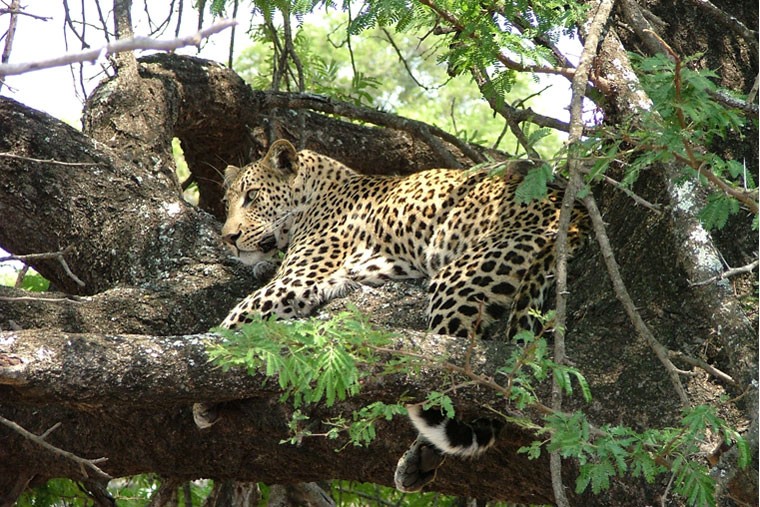
South Africa Walking Safari to Kruger & Zululand
A great holiday to South Africa with an emphasis on some great walking trails. Visit the Kruger National Park, Swaziland, the St Lucia area, the Battlefields…

8 Day Uganda Gorilla Safari from Kampala (Lodge Overland Tour)
A budget Uganda Gorilla Safari (Lodge Overland Tour) to see wild African Mountain Gorillas includes Uganda Gorilla Trekking, Murchison Falls & Chimpanzee…

9 Day Budget Masai Mara & Serengeti Safari - Tanzania & Kenya
This 9-day budget lodge safari is a Tanzania & Kenya Safari to Masai Mara, Serengeti National Park, Ngorongoro Crater & top African wildlife parks with…
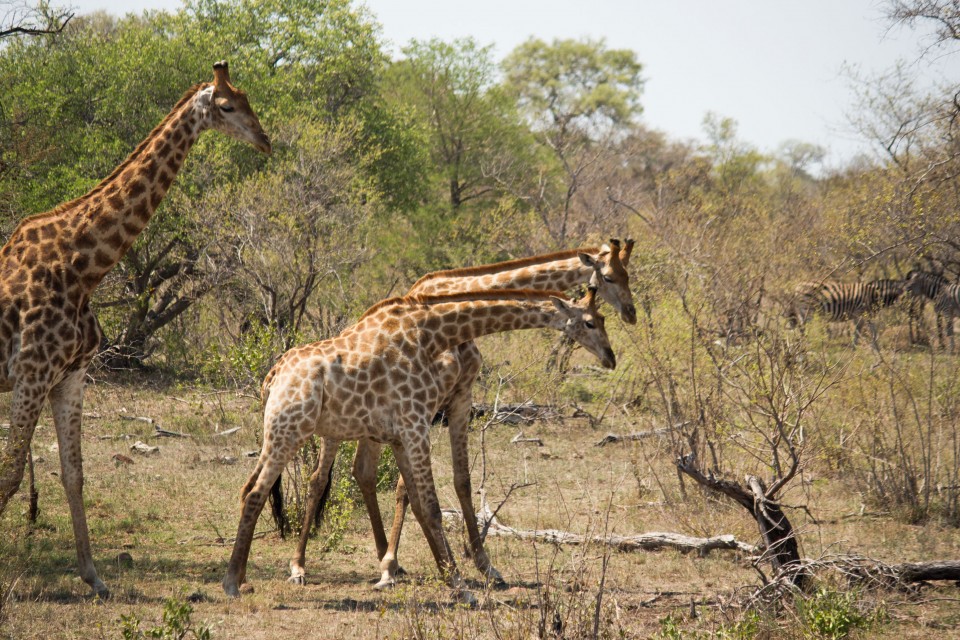
3 Day Kruger Safari & Private Reserves Camping Tour
Our budget-friendly Kruger Safari & Private Reserves Camping Tour in South Africa explores Kruger National Park and camps at private game reserves in Greater…

20 Day Best of South Africa Safari - Johannesburg to Cape Town Tour
The guided Best of South Africa Safari (Johannesburg to Cape Town) is an excellent-value, small group budget lodge safari to top wildlife parks & attractions…

Connect with us
Useful resources.
- Get Travel Insurance
- Book Flights
- Get Car Hire
- Signup for our newsletter
Popular Destinations
Latest blogs.
- How to plan an African safari on a very tight budget: the 8-step guide to safari planning
- Top 10 Safest Countries in Africa to Visit (2024 Global Peace Index Rankings)
- Best Countries to Visit in Africa? Here are 15 Amazing African Countries
- South Africa Tipping Etiquette: 8 Top Tips for Tipping in South Africa

Call us toll free from US/Canada on 1-888-414-6513 , or from the UK on 0-808-189-1052 . All other countries can contact us on +27 21 791 0878 .
© 2024 African Budget Safaris | Privacy | Terms | Cookie Policy | Consent Preferences
What is an African Safari?
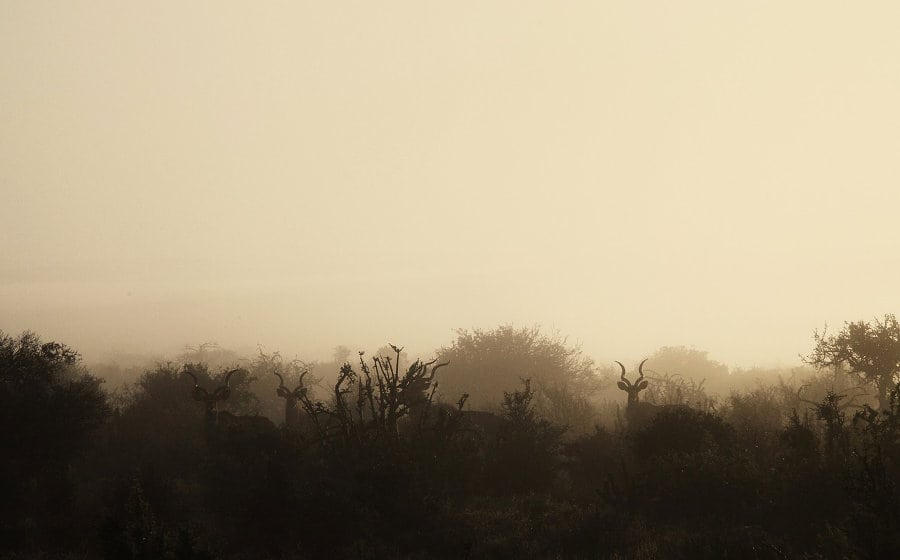
Africa is untouched and untamed .
Safari is raw and unscripted .
You’ll be centerstage in the greatest wildlife theatre on earth, face to face with the wonderful mammals that walk our planet.
It’s the ultimate adventure and there’s no predicting what will happen next.
Lions? Elephants? Wildebeest herds and yawning hippos? Spotted cats on the prowl?
An African safari is all this and so much more . You’ll be immersed in the wilderness , connecting with all your senses.
The journey has already started. Keep reading as this page provides all the essential information about a safari . Hint: it’s nothing like a zoo. In Africa, you’re going into the wild.
- An introduction to safari
- Safari activities
- Safari accommodation
- Food on safari
- The cost of a safari
Words and phrases
Personal account.
- Access or purchase personal subscriptions
- Get our newsletter
- Save searches
- Set display preferences
Institutional access
Sign in with library card
Sign in with username / password
Recommend to your librarian
Institutional account management
Sign in as administrator on Oxford Academic
safari noun
- Hide all quotations
What does the noun safari mean?
There are four meanings listed in OED's entry for the noun safari . See ‘Meaning & use’ for definitions, usage, and quotation evidence.
How common is the noun safari ?
How is the noun safari pronounced, british english, u.s. english, where does the noun safari come from.
Earliest known use
The earliest known use of the noun safari is in the 1860s.
OED's earliest evidence for safari is from 1860, in a paper by Richard Burton, explorer and author.
safari is a borrowing from Swahili .
Etymons: Swahili safari .
Nearby entries
- sadware, n. 1683–
- sadza, n. 1899–
- sae, n. Old English–
- S.A.E., n. 1924–
- S.A.E., n. 1939–
- saeta, n. 1898–
- saeter, n. 1799–
- sae-tree, n. 1880–
- saeva indignatio, n. 1796–
- Safaitic, adj. 1887–
- safari, n. 1860–
- safari, v. 1908–
- safari ant, n. 1910–
- safari bed, n. 1936–
- safari camp, n. 1912–
- safari jacket, n. 1938–
- safari lodge, n. 1953–
- safari look, n. 1956–
- safari park, n. 1969–
- safari ranch, n. 1960–
- safari suit, n. 1935–
Thank you for visiting Oxford English Dictionary
To continue reading, please sign in below or purchase a subscription. After purchasing, please sign in below to access the content.
Meaning & use
Pronunciation, compounds & derived words, entry history for safari, n..
safari, n. was revised in September 2011.
safari, n. was last modified in July 2023.
oed.com is a living text, updated every three months. Modifications may include:
- further revisions to definitions, pronunciation, etymology, headwords, variant spellings, quotations, and dates;
- new senses, phrases, and quotations.
Revisions and additions of this kind were last incorporated into safari, n. in July 2023.
Earlier versions of this entry were published in:
A Supplement to the New English Dictionary (1933)
- Find out more
OED Second Edition (1989)
- View safari, n. in OED Second Edition
Please submit your feedback for safari, n.
Please include your email address if you are happy to be contacted about your feedback. OUP will not use this email address for any other purpose.

Citation details
Factsheet for safari, n., browse entry.

African Safari Explained: What, Why, Where, When, and How much
by Erika Atienza | 5 comments
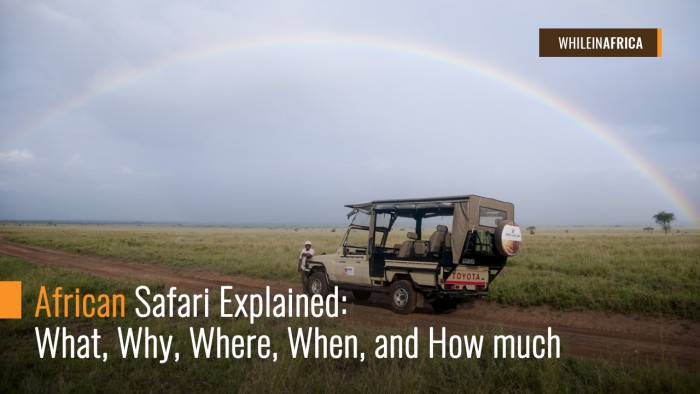
How To Get There
“African safari is an expedition or a trip, usually by tourists, to observe animals in their natural habitat.”
These natural habitats can be national parks or game reserves such as Kruger national park in South Africa, Masai Mara in Kenya, and Serengeti in Tanzania. For the sake of basic understanding, I will limit my examples to these Top 3 safari destinations that are also my personal favorites.
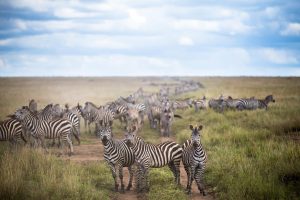
Serengeti National Park, Tanzania
Serengeti in Tanzania is one of the famous national parks in the world. It spans thousands of kilometers where animals including Simba and Mufasa live and hunt freely. They don’t belong to an owner and they roam wherever they like. You might as well call them wildlife citizens of Tanzania because they live there and are protected by rights in that country.
So as a tourist in Africa, the way to see them is to go on a safari.
Types of Safaris
There are different forms of African safaris. The most notable ones are walking safari, hiking, or the most popular, game-drives.
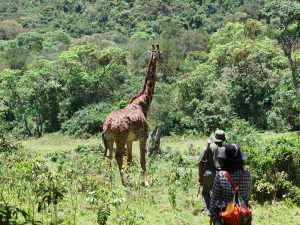
Walking Safari
A walking safari involves you, your fellow travelers and a qualified guide along with an armed game scout that will take you to the best spots in the park to see wildlife or picturesque views. Like any other type of safari, walking safaris may either be a private tour or a group wherein you join other travelers.
Hiking Safari
Hiking safari, on the other hand, is when you go on a trekking expedition to experience the mountains like Mount Kilimanjaro, Mount Kenya, and the Drakensburg mountains. Usually, people combine these safaris with game-drives.
Game-Drives
Game-drives are a staple safari activity. You explore parks and game reserves by riding a vehicle with a pop-up roof. A tour guide/driver will come with you to drive for several hours in search of wildlife. You will drive from between 5-6 hrs. a day and whenever your guide sees a Lion, elephant, or any wildlife, you will stop to see them and/or take photos from inside your vehicle (through the pop-up roof).
Unlike in a zoo, there’s no set place to see the animals. Nobody knows where they will be hanging out at any time of the day, but your professional guide who’ve had years of training and experience spotting wildlife would know where they “might” be. This is why it’s important to have a good tour guide or else you will miss seeing the animals.
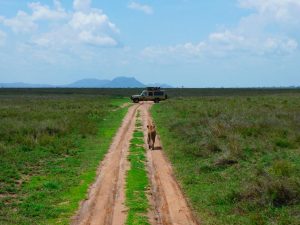
Game Drive Safari in Tanzania
Before I traveled to Africa and did my first safari, my only knowledge of the wild are those that I see from the National Geographic Channel or Animal Planet. My closest encounter would be from the not-so-many ZOOS that I’ve been too.
It was so surreal to see animals in their habitat where they live freely. It’s like finally meeting a celebrity you’ve only known and seen your whole life on TV. I was starstruck to see Mufasa come to life gracefully walking in the savannah to join his pride. My jaw dropped when I saw a towering Giraffe up close, and elephants walking past our vehicle felt like a Jumanji experience. All the while, Enya’s Storm in Africa song played in my head as I witness all of it.
You can see temples, museums, and beaches everywhere but an African safari is a completely different experience. It’s out of the ordinary where it feels like traveling to another planet — Animal Planet. The Lion King movie is fiction but the setting and the casts are all based on reality. So if you go to Kenya or Tanzania , you’ll see the real setting and meet the full cast of Lion King… or maybe even more.
If you get the chance, think no further and just go. An African safari is something you should do at least once in your lifetime.
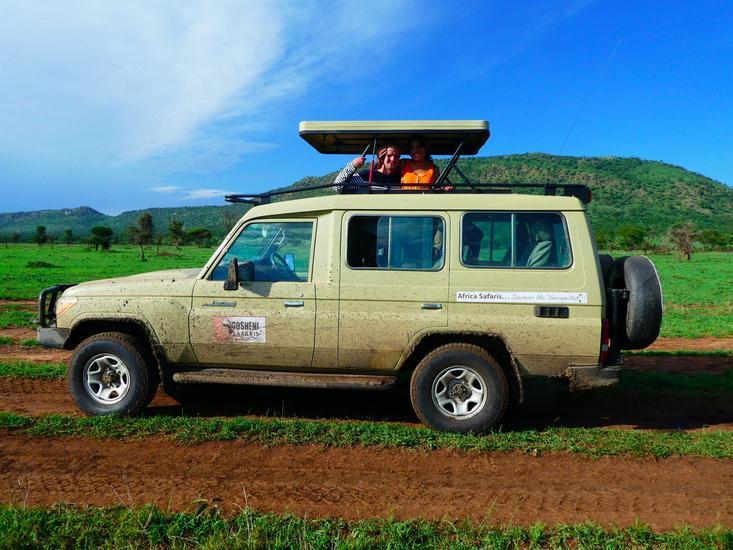
Safari road trip in the Animal Planet
There are several African countries where you can do a safari but the top ones are: Kenya, Tanzania, and South Africa
There are several African countries where you can do a safari. South Africa is a popular safari destination being more developed and more-friendly for tourists who want to have more flexibility in doing their safari. Self-drive safaris are common here. This means that you can drive your vehicle because the park has signposts and even have restaurants and gas stations within the area.
In my case, I prefer Kenya or Tanzania if you want to experience a full African cultural immersion. The fact that it’s not as developed, and not as accessible all adds to the African charm. You will see tribes and hundred-old traditions that still survive and the overall ambience screams Africa better than anywhere else. But this also means you have to depend on a tour operator to arrange for everything including accommodation and meals for the whole duration of your safari. The good thing is, you can always tell them what you want to experience, what you want to see and where you want to go so they could design an itinerary that fits your liking.
Around 500 USD per person for a 5 days safari (all-inclusive), meaning all meals, tours, and budget accommodation is included
Around 1000 USD per person for a 5 days safari (all-inclusive), meaning all meals, tours, and budget accommodation is included
Around 1500 USD per person for a 5 days safari (all-inclusive), meaning all meals, tours, and luxury accommodation are included
South Africa
The budget on a safari in South Africa will depend on the activities you ought to experience. If you add a hot air balloon ride or a helicopter tour, for example, prices can soar up to 400 USD for the helicopter add-on alone. The accommodation also affects the entire budget. If you choose a no-frills camping safari, 120-200 USD per person per day would suffice. If you go for the ultra-luxe tented camps, prices can go as high as 1000 USD per person per day or even more.
Compared to East Africa, South Africa is more affordable with an even wider range of accommodation options. Park fees are also cheaper and you can always opt to self-drive. Although frankly, self-driving or doing-it-yourself doesn’t automatically mean it’s the cheaper option. It often can be, but sometimes, all-inclusive packages from tour operators can be less expensive as well. So it’s better to weigh your options first.
Kenya versus Tanzania
Kenya is usually cheaper because it’s common to do a group-joining safari, meaning if you’re alone, you can join other travelers and therefore pay a lower cost. Masai Mara, the most popular park in Kenya, is smaller hence, it’s easier to spot animals. It’s the best place to see the Big 5* too. Tanzania usually only offers private safaris so it’s more expensive especially if you’re traveling alone. Serengeti, the famous park in the country and probably all over Africa, is much bigger so you have to drive farther and the search for wildlife usually takes longer. Overall, both countries have their charm with Kenya being more affordable and accessible.
All safaris are the same, meaning they visit the same parks and game reserves. The only difference in each safari is the accommodation, which is usually classified into BUDGET, MIDRANGE and LUXURY. The rates also differ as levels of service vary from one tour operator to another.
*BIG 5 – Lion, Elephant, Rhinoceros, Leopard, Buffalo. These are the most difficult to see and therefore usually make up the Must-see wildlife when in Africa.
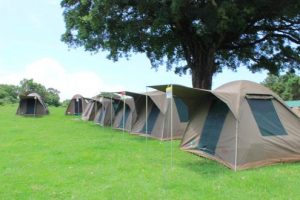
Budget Accommodation
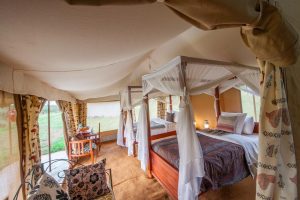
Midrange Accommodation
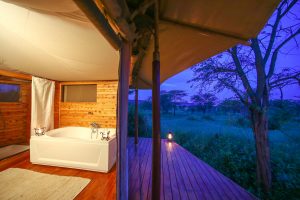
Luxury Accommodation

Between May and September- the best time to see wildlife in Kruger or other safari parks
Kenya and Tanzania
Between June and October- wildlife viewing in either country is at its prime
June to August – best season to see the Wildebeest Migration
As year-round destinations, South Africa, Tanzania and Kenya promise excellent holidays, meaning you can go on a safari at any time of the year. But, considering factors like rain and wildlife viewing quality, the best times to visit these countries may vary. Also, if you’re eyeing to see the top wildlife events such as the Great Migration, you should know when and where to go for you to be able to catch it.
South Africa has a varying regional climate although it is mostly sunny and warm with cool nights. The best time to see wildlife in Kruger or other safari parks is between May and September when animals congregate around watering holes and there are fewer tourist crowds. If you want to add other activities in your trip, July to November is ideal for whale watching while November to February is splendid in the Cape.
Being by the Equator, both Tanzania and Kenya share the same climate classified into wet and dry seasons. With less vegetation during the dry season, particularly between June and October , wildlife viewing in either country is at its prime. You can easily spot wildlife around you and it’s almost always a guarantee that many of them are around the watering holes. This is also an optimal time to see the Great Wildebeest Migration in the Serengeti in Tanzania. By this time, the herds have reached the Western Corridor and then by the end of July to late September, they will be experiencing the toughest feat of their journey: the Mara River crossing. For October and early November, Masai Mara in Kenya is the place to go as the surviving herds celebrate their survival in a feast of fresh grasses.
By late December to early March , the wildebeest calving season in southern Serengeti, Tanzania ensues. This is another event, which is part of the Great Migration, that should not be overlooked because predator action is guaranteed to be at its finest — from predator-prey action to predator vs predator activity.
The Great Migration is a special event that most people dream of seeing firsthand. I never once thought I would be able to witness such an incredible wildlife event but I did. And you should, too. The animal movement is spectacular beyond words… About two million wildebeests, zebras, and gazelles move across the plains to find better grazing while opportunistic predators like lions, hyenas, cheetahs, leopards and Nile crocodiles prowl in anticipation for food. So if you want to experience the wildlife, don’t miss out on the Great Migration.
HOW TO GET THERE
Kenya and South Africa are the biggest hubs in Africa because their major international airports are linked to the rest of the world by many major airlines. Due to competition, flights to these countries are also cheaper compared to flights towards Tanzania, Uganda, and other African safari countries.
To South Africa
The main gateway to a safari in South Africa is Tambo International Airport (JNB) in Johannesburg . From the US, direct flights are only offered by South African Airways and Delta Airways. Flights depart from New York (JFK) and Washington Dulles or for Delta flights, it departs from Atlanta. From the UK and Europe, several flights from almost all major airport offer daily flights to JNB. There are other international airports, too, like Cape Town and Durban international airports but these are usually for those who would like to explore other parts of South Africa. For example, if you’re planning to start your tour with wining and dining and exploring the Garden Route, your best bet is to fly to Cape Town international airport.
In Kenya, the main airport is Jomo Kenyatta International Airport (NBO) in Nairobi . This is one of the busiest airports in Africa and is another popular point of entry for many tourists across the globe. From the US, you can fly directly to Nairobi from New York (JFK) via Kenya Airways or you can take connecting flights from other cities like New Jersey (EWR), Washington Dulles (IAD), San Diego (SAN), Washington DC (DCA), Baltimore (BWI) and Chicago (ORD) via airlines such as KLM, Qatar Airways, United, Egyptair and Turkish Airlines. Like flying to South Africa from the UK and other parts in Europe, you can get several flights from almost every major airport including Heathrow, Glasgow, Manchester, Amsterdam, and Zurich. For travelers from Asia, Australia, and New Zealand, the most common stopover point is the Middle East, particularly Dubai.
There is another airport in Kenya which is the Moi International Airport in Mombasa. This airport is popular for those who want to start their safari with a visit to Kenya’s coastal areas.
To Tanzania
Flying to Tanzania may be more expensive compared to South Africa and Kenya and flights, although plenty, aren’t as much available. What other people do is book a flight via Nairobi or Johannesburg and then take a connecting flight to Tanzania, which is usually cheaper than a direct flight. The main airports in Tanzania are Kilimanjaro International Airport (JRO) in Arusha , which is perfect for those who are exploring the northern circuit safari parks (Serengeti, Mount Kilimanjaro, Lake Manyara National Park, Ngorongoro Crater, etc.); and Julius Nyerere International Airport (DAR) in Dar es Salaam , which is the most ideal entry hub for those seeking to discover Tanzania’s remote southern safari parks (Selous, Ruaha, Mikumi, etc.) or fly to Zanzibar.
From Europe, you can fly from UK airports such as LHR and LGW or from Amsterdam to Dar es Salaam. No flights are available straight to Kilimanjaro so the most advisable way of getting there is to take a connecting flight via Nairobi or Dar es Salaam. From the US, travelers can take connecting or multiple-stop flights via Amsterdam, UK or Istanbul. Travelers from Asia can depart from Hanoi in Vietnam, Bangkok in Thailand or Mumbai in India. Flights to both DAR and JRO are available from there.
Flight Cost
The costs of flights may vary but to give you an overview, the US to Johannesburg round trip fares can go as low as $680 and the UK to Johannesburg as low as $570 (£428). For flights to Nairobi, you can get roundtrip tickets from the US for about $750 and from the UK for about $533 (£400). The flights to Tanzania will generally cost more especially if you’re flying to Kilimanjaro International Airport in Arusha. However, you can also score as low as $650 for a round trip fare from Amsterdam to Dar es Salaam. Of course, factors like the season of travel and travel mileage can alter price range so it’s better if you check the prices with your preferred airlines first.
Photo Credits: Gosheni Safaris Africa
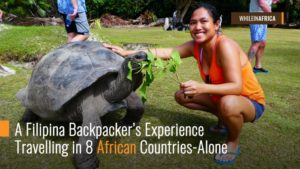
Related Articles
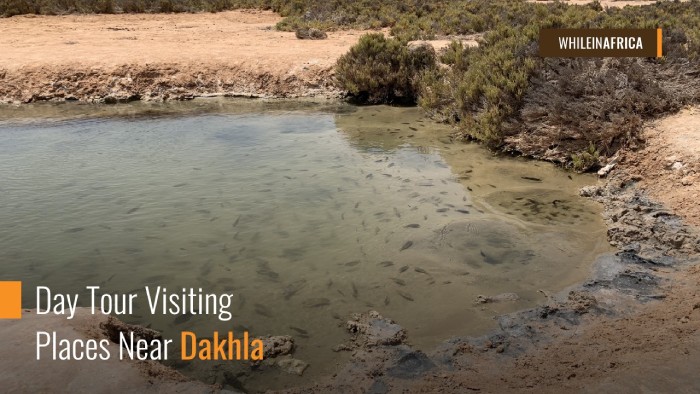
- Day Tour Visiting Places Near Dakhla
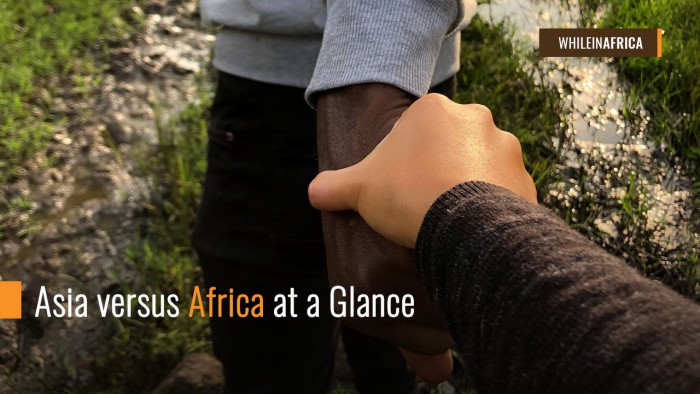
Asia versus Africa at a Glance
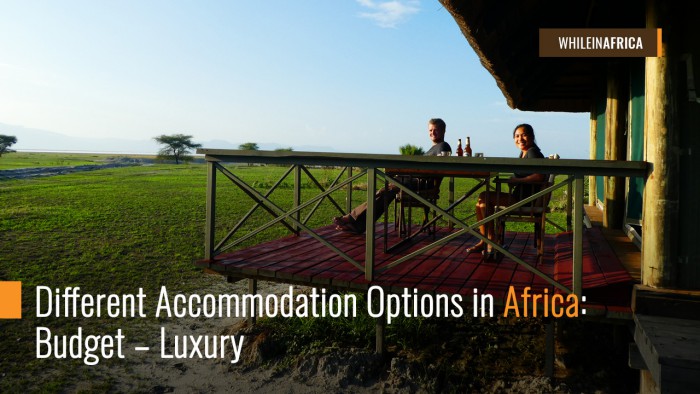
Different Accommodation Options in Africa: Budget – Luxury
Thanks so much for this lovely post please i have read the whole post please thanks so much
I have a enjoyed reading this post thanks so much please
This is great information! The big 5 is definitely a sight worth seeing. I wrote a few tips to consider if you ever go on an African safari! https://bmoblogs.com/2020/07/19/my-african-safari-experience/
-The Blogging Zoomer
Surely i did a enjoy reading this post thanks so much for the time you spent writing this post
I enjoyed this post.I read your blog site relatively typically, and you are constantly bring out some great content. I shared this oon my Facebook page, and a lot of my followers enjoyeed it. Keep up the good work
Trackbacks/Pingbacks
- 6 Most Magnificent Animals To See on the African Safari - Abeid Shaban - […] you love observing wildlife in their natural habitat? If so, you will fall in love with the African Safari.…
Submit a Comment Cancel reply
Your email address will not be published. Required fields are marked *

We are Erika and Martin from the Philippines and Denmark traveling through Africa. We like to explore new sights, live local, and show the Real Africa. Keep reading.
Latest Articles
- A Tanzanian safari after the pandemic: When to go and what to expect
- Crossing Borders Dakhla to Mauritania
- Before Your Trip
- What To Do in Arusha in-between Safaris
About Africa Crossing Borders Experiences Filipino Corner Plan A Trip Sustainable Travels Visa Guide
What is an African Safari
What is an African safari?
Practically speaking, an African safari is a vacation or tour to a wildlife reserve in an African country for the purposes of seeing and photographing a range of wildlife in their natural habitat, in order to observe their natural way of life. African safaris are about immersing oneself in nature and observing wildlife go about their daily life, unhindered by the human race. Meeting locals and learning about their fascinating culture is also an enlightening experience whilst on safari. But above all, a safari in Africa is about going on an adventure and not knowing what to expect next.
The Different Types of African Safaris
Luxury and mid-range luxury safaris.
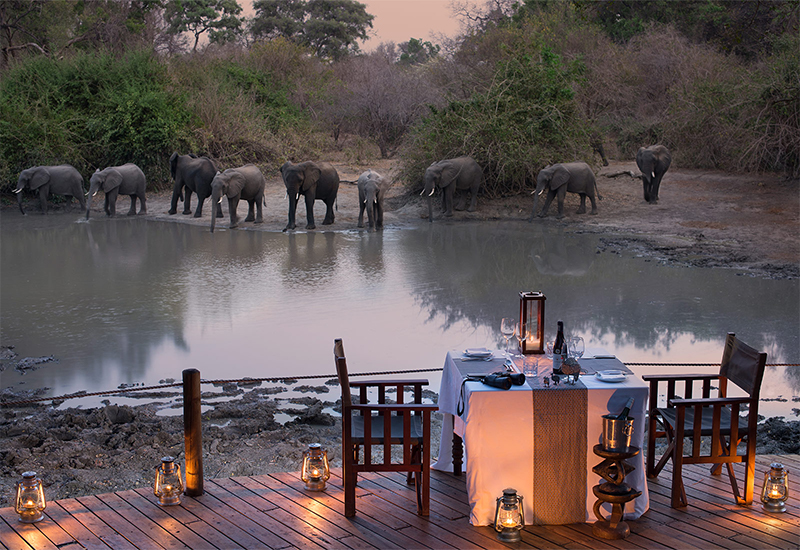
Incredible elephant sightings are part of the dining experience at the luxurious Kanga Camp.Luxury safaris are offered in all the best wildlife viewing game reserves in Africa - often in private concessions, and will include top-end or mid-range luxury lodges and tented camps. These lodges and camps provide unbeatable valuable: ensuring guest privacy, world-class facilities, a personalized service, exclusive game viewing activities, and opulent accommodation. These safaris are generally fully inclusive - all your meals, local brand beverages, and a range of safari activities. The most lavish of lodges will even include private dining experiences, spa treatments, and a private butler service.
Fly-in Safaris
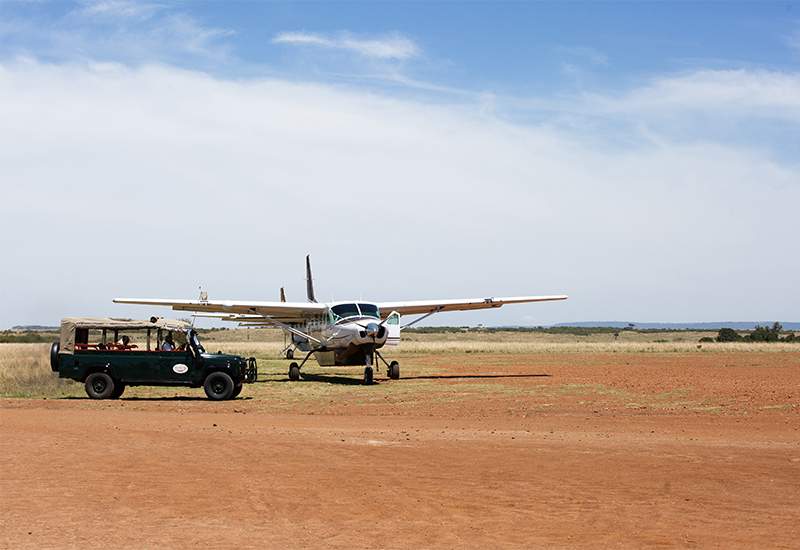
Scenic air transfers are how one gets around Kenya, flying low enough to admire the landscape and wildlife.In remote safari destinations such as Botswana, flying directly to a reserve and flying between different reserves, is the most feasible transportation option. It not only allows one to visit inaccessible places but often avoids driving on roads comprising of deep sand or rough gravel. Although fly-in safaris are usually more expensive and often require the use of smaller charter flights with strict luggage restrictions, they do save a lot of time - especially when you are visiting for a short period of time. These smaller planes fly below the clouds, offering incredible views of the wilderness and animals.
Walking Safaris
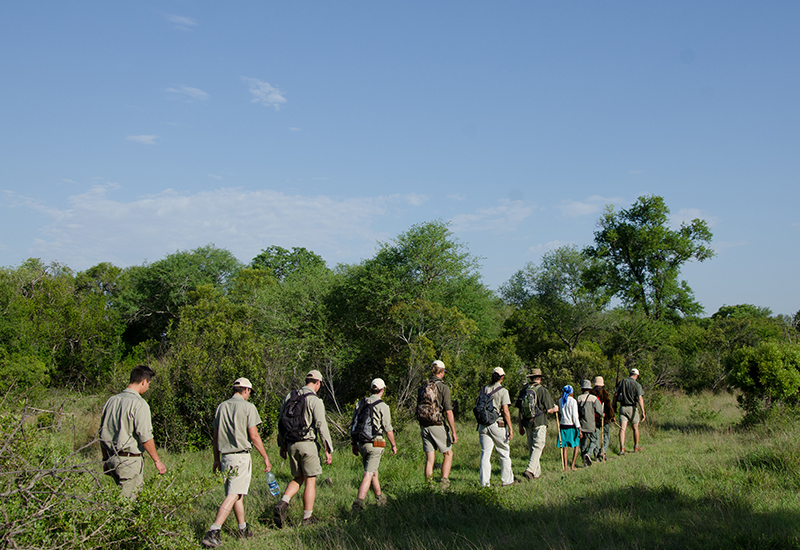
Walking safaris are a great way to learn about fauna and flora that is of great significance to the African bush.Nothing gets the heart pumping as fast as a walking safari does in big five country. Many lodges in Africa generally provide short guided bush walks as part of their safari offering but there are also those that focus the guest experience entirely around walking. These safaris are led by armed and highly trained guides and sometimes even a tracker. These guides offer a fountain of knowledge, sharing interesting facts about plants, trees, birds, skat, and animals. Walking safaris allow one to feel part of the bush and awaken all of your senses - appreciating the gift of sight, taste, and smell.
Mobile Camping Safaris
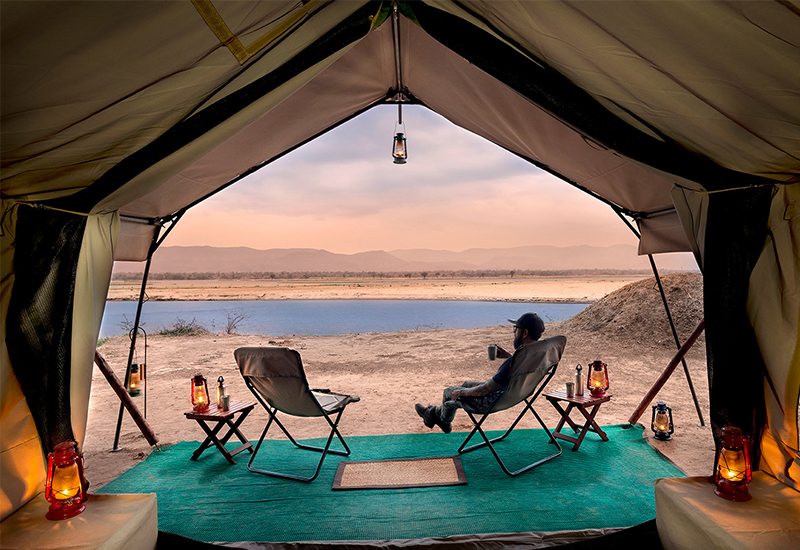
Experience an authentic wilderness experience at Zambezi Expeditions Camp in the iconic Mana Pools National Park.Mobile camping safaris vary in group size, some operating with as little as two travelers and others with as many as twelve. A safari of this kind requires travelers to move around a lot more than any other safari experience, winding through the wilderness on 4x4 vehicles - getting that much closer to nature. Mobile camping safaris have the lowest impact on the environment and are definitely suited to the more adventurous traveler. The camps are set up by the staff and sumptuous meals are prepared over an open fire. The more luxurious mobile safaris will run with a smaller number of guests and guests tents are decked out with comfortable beds, chairs, lighting, and warm bucket showers.
Specialist Safaris
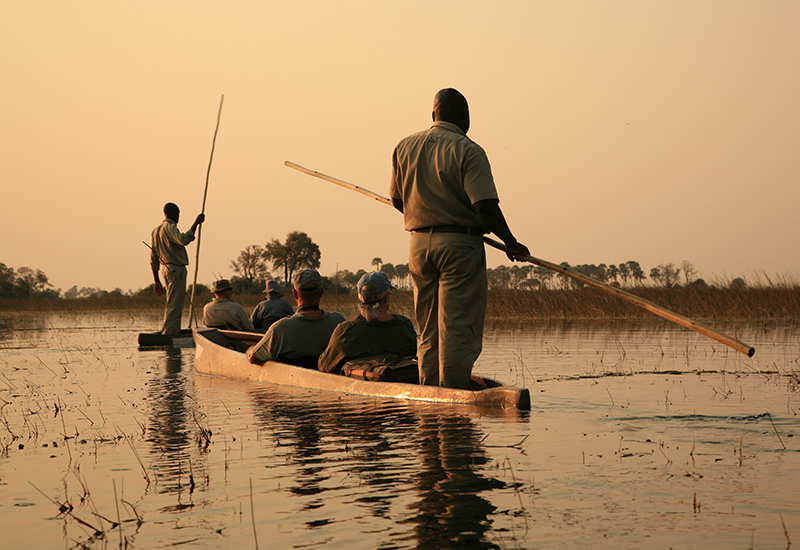
Nothing is more tranquil than gliding through the shallow channels of the Okavango Delta in a mokoro.A specialist safari focuses on specific interests pertaining to a safari. These one of kind experiences are led by guides that have trained in this particular field, ensuring an unforgettable guest experience. Some specialist safaris are only available on a private basis or operate in small groups. Here are some of the specialist safaris on offer in Africa:
- Photographic safaris
- Birding safaris
- Horseback safaris
- Canoeing safaris
- Gorilla trekking safaris
- Wildlife tracking safaris
- Whale watching safaris
Safari Activities
Game Drives Game drives are the core component of a safari because they cover a lot more ground than any other activity. In some reserves, game drives could be a full day affair but generally game drives are offered in the morning and late afternoon for about 3 to 4 hours at a time.Game drives in private reserves offer the most exclusive game viewing opportunities, with the number of guests and vehicles limited. The safari vehicles are open-sided except for East Africa where the vehicles are top open. Safari vehicles in private concessions are permitted to go off road - allowing guides to track animals and follow them into the bush. The morning game drives are generally the best for game viewing and often the best time to sight predators. Late afternoon game drives will often see animals grazing, resting in the shade of a tree, or drinking from waterholes. Once the sun sets and temperatures drop, guests have a greater opportunity of seeing nocturnal species and possibly even witness a kill as lions favor the cooler evenings to hunt.
Bush Walks Short walks are offered at several lodges and camps as a mid-morning activity. You climb into a vehicle and drive into the bush with your armed guide. After a safety briefing, you head out on foot to discover the different fauna and flora. A bush walk is a great way to learn about the much smaller yet significant creatures of the bush, as well as animal tracking. Bush walks most certainly heighten your senses as you rely on your sight, hearing, and nose.
Boating/Mokoro/Canoeing Safaris on the water offer a different game viewing perspective, generally offering up-close views of hippos, crocodiles, aquatic birdlife, water antelope, and even elephants taking a swim. Mokoro (traditional dugout canoe) safaris are often the highlight on a safari in Botswana, gliding quietly through the shallow waters of the Delta. Boating safaris cover a lot more distance and are thoroughly enjoyed in places such as Chobe National Park, where the Chobe River is the main source of water for the wildlife. Sightings of elephants playing and swimming in the river are a usual occurrence in Chobe.Canoeing safaris are a popular choice in destinations such as Zambia and Namibia, riding the rapids and discovering wildlife along the way.
Bird Watching Bird watching is a fun activity that is possible at any of Africa’s game reserves. With as many as 500 species of birdlife to be seen in places such as the Kruger and Chobe national parks, bird lovers will have plenty to mark off their species list, some even endemic to the region. Staying in private reserves affords bird watchers the opportunity of spotting birdlife from the comfort of their lodge or camp, during game drives and bush walks, and various bird hides located in some of the game reserves. Private Birding safaris can also be arranged in some instances.
Hot Air Balloon Rides A hot air balloon safari is only possible in certain reserves across South Africa, Botswana, Namibia, Kenya, and Tanzania. Taking to the sky as the sun begins to rise is an experience you will never forget. As the sun lights up the savannah plains, lakes, and lagoons, so the bush comes to life. It’s a bird’s eye view of the region’s diverse landscape and incredible wildlife often gathered in areas unattainable by game drives. It is important to note though that balloon safaris only run if the weather conditions are good.
Scenic Flights Scenic flights have become a popular activity choice amongst visitors to Africa, often perceived to be the fastest way of seeing some of the world’s natural wonders - flying over the mighty Victoria Falls, spotting wildlife in a big five game reserve, and admiring the vastness of the Namib Desert. Flying safaris are generally private experiences conducted in smaller aircraft such as bantam microlights and helicopters. In places such as the Okavango Delta, travelers get to experience incredible views of the Delta and its intricate network of waterways during their light aircraft transfers.
Wildlife Interactions Throughout Africa, travelers will encounter several wildlife rehabilitation centers and animal orphanages that offer educational interactions, and in some cases like the Daphne Sheldrick Elephant Orphanage, visitors can even adopt an elephant. It is an opportunity for people from around the world to gain a better understanding of animals, and contribute to their protection and care within these facilities. Game reserves such as Shamwari and Phinda even offer their guests the option of actively getting involved in wildlife conservation - anti-poaching, darting, moving of animals.
Mountain Biking & Horse Riding Safaris Mountain biking like walking is a great way to get close to nature, with the exception of covering more ground than simply exploring on foot. Without the restrictions of a vehicle, mountain biking safaris are a thrilling experience and are offered as part of the safari experience at lodges and tented camps in South Africa, Kenya, Tanzania, and Zambia.It’s also the perfect way to burn off those calories from the decadent cuisine that comes with a safari. Mountain bike safaris are offered at several camps
Gorilla Trekking Often regarded as the ultimate safari experience in Africa, gorilla trekking is by permit only and is generally limited to a group of eight people. Uganda, Rwanda, and the Congo offer the opportunity to get up close to these gentle giants in their natural habitat. Trekking through a petrified forest to find endangered mountain gorillas could take as long as five hours. Once you find your assigned gorilla family, you will have an hour to admire and photograph them. The minimum distance between visitors and gorillas is seven meters but it is not uncommon for gorillas to walk up to or through the group.
Ocean Safaris An ocean safari starts and ends on one of Africa’s most pristine beaches. It’s about experiencing close encounters with various whale species and dolphins whilst out at sea on a boat. Other ocean safaris include shark cage diving off the coast of Cape Town and diving amongst coral reefs in South Africa, Mozambique, and Seychelles.
How to Plan an African Safari
Traveling to Africa is a big deal! With so many safari tours out there to choose from, pinpointing the right safari can be somewhat difficult.
A lot goes into the planning of a trip to Africa with various elements to consider, including flights, transfers, lodges, travel insurance, and activities.
Our advice is simple - use an accredited travel company that specializes in trips to Africa. There is value in knowing that you are chatting to someone who knows what they are talking about and will be there for you every step of the way. Not planning a trip to Africa correctly is easy and can be disastrous.Read on further if you want to find out how to book the perfect African safari...
Let's Get Planning
Top Destinations for an Unforgettable African Safari
Whether you travel to the eastern reaches of Africa or the south, each is diverse in landscape, wildlife, and experiences.
South Africa boasts some of Africa’s best big five game reserves, including the Kruger National Park, Madikwe Game Reserve, KwaZulu Natal, and the Eastern Cape.
Botswana is a popular safari destination known for its exclusive safari experience. Glide through the crystal clear waters of the Delta on a mokoro, discover the big five and endangered wild dog on game drives in the Moremi, cruise along rivers in a speedboat and see hippos, crocodiles and even herds of elephants up-close. There is so much to experience in this vast wilderness. Tanzania and Kenya are renowned for the world’s greatest mammal migration and offer sightings of animals in huge numbers. It is here where one can view the big five, climb mountains, or even spend some time relaxing on a tropical beach. Zambia and Zimbabwe share custody of the mighty and glorious Victoria Falls - the world’s largest curtain of falling water. But each side of the falls also offers a safari adventure of a lifetime. Game reserves such as Hwange and Mana Pools in Zimbabwe, and Lower Zambezi and Kafue in Zambia are top choices for. These parks are the essence of wild Africa - remote, home to an abundance of wildlife, and great for walking safaris. Rwanda , Uganda and the Congo offer the ultimate safari experience in Africa - the opportunity to come face to face with some of the world’s last remaining mountain gorillas. These protected parks are also home to other animal incredible species such as golden monkeys and chimpanzees.
The Cost of a Safari
The cost of a safari can vary based on several factors, however, the two biggest contributors are logistics and comfort - the use of charter flights to access remote safari destinations and operational costs such as running generators and delivery of supplies. In conclusion, the more remote the destination and the more luxurious the accommodation, the higher the cost of a safari.Read on further to gain a better understanding of the cost of a safari.
More Stories from Archive

+255 763 058 584 +255 682 784 150 [email protected]

What Is Safari?
What Is Safari? Everything To Know About An African Safari : What does the word “safari“ means, and where did it originate? In what ways do safaris from the past differ from contemporary African adventures? For the finest experience, where should I go?
Safari is…
When we hear the word “safari“, we picture a group of travelers traveling over the savannah of Africa in pursuit of big wild animals like elephants, buffalo, rhinoceros, and lions. Images from the past typically depict guys wearing pointed helmets and brandishing firearms, while images from the present day show individuals driving SUVs and clutching long-lens cameras. It’s a literal quest for animals, or more accurately, a hunt for photos in the immensity of the hottest continent. Fashion experts might also recall straight-cut, beige-colored garments with a wide belt and a wide-brimmed hat, which were a holdover from the British military’s time spent in Britain’s colonies in Africa. These are all the first things that come to mind when we hear the lovely word “safari“, which has the sound of an Arabic given name.
Today’s safari is a sightseeing trip to a national park in Africa with the primary goal of seeing wildlife. Safaris used to be planned with the intention of hunting big game. The traditional Big Five of Africa—the elephant, lion, rhino, African buffalo, and leopard—are connected to the continent’s hunting customs. These five creatures were regarded by hunters as the most dangerous and challenging to hunt, and their body parts were the most sought-after trophy.
These days, the majority of people in modern society adore safari hunting. It is still allowed in a very small number of reserves, though. There are tight legal restrictions on this extremely costly hobby. Hence, the great majority of safaris offered nowadays take place in off-road vehicles traveling along paths marked by national parks, where visitors can see wild creatures, get up close or through binoculars, take pictures, and watch how they behave in their natural habitat.
The primary language of the people of East Africa is Swahili, from which the word “safari” is derived. This word translates to “journey, trip“and has its roots in the Arabic word “safar.“ In nations where Swahili is spoken, the phrase can apply to any kind of trip. The expression “safari njema!“ is even more widely used! It’s a desire for safe and enjoyable travel.
THE HISTORY OF AFRICAN SAFARIS
The early African colonial period, which lasted from the late 1800s to the early 1900s, is when the modern safari idea originated. The first European colonists and explorers brought with them the first safari-style trips. Many of them were specifically sent out to hunt animals, while others had the goal of exploring new areas.
A small army of local tribespeople hunted and laboriously dragged enormous animals overland on these early European-led excursions.
Subsequently, the idea gained popularity in the US when US President Teddy Roosevelt went on a large safari, purportedly to fill the Smithsonian Institute with African specimens. 11,400 animals, including 512 big game animals like elephants, lions, leopards, buffaloes, hippos, and rhinos, including six rare white rhinos at the time, were killed by the party’s rifles.
In the modern era, the majority of safaris in Africa no longer include hunting. Fortunately, hunting as a primitive activity is largely extinct. The great majority of Africa has long since evolved past this colonial-era practice, and it is no longer the standard.
WHAT KINDS OF SAFARIS ARE THERE?
In modern East Africa, a traditional safari is traveling across a national park’s vast breadth in an off-road vehicle with a driver-guide to see wild animals in their native environments. Herds of elephants, buffalo, zebras, and several species of antelope traverse the savannas and woods, accompanied by solitary or small-group giraffes. Monkeys and birds frequently live in the trees, and warthogs lurk in the bushes’ shadows. Lion prides and lone carnivores like cheetahs and leopards hunt large herbivores. Hyenas and jackals select smaller prey. To avoid the heat, crocodiles and hippos seek refuge in waterways. Safari travelers have a really special chance to witness all those breathtaking scenes that are alive with life.
What are the advantages of driving around a national park in a car? This enables you to witness a multitude of creatures of various kinds in a little over two to three hours. Additionally, rangers use radio-communication to alert safari car drivers to noteworthy sightings, such as a large pride of lions or a rhinoceros, allowing you to promptly make your way to the area to witness those creatures. The most common safari style is the off-road vehicle ride, although there are other options as well.
You can go on a safari on foot in some places when the safety situation allows. This is typically set up in places devoid of large herds grazing and where assaults by large animals are rare. An armed ranger goes with tourists for added security. Through safari walks, you can discover nature by coming into direct contact with it, study the local plant life, and get as close to the park’s natural environment as possible.
Roaring over the savannah in a hot-air balloon is one of the most breathtaking and unique safari experiences in Africa. This will ensure that everyone visiting a national park has an exciting time. As you soar into the sky in a hot air balloon, you’ll be able to take in the immensity of the landscapes below and experience the genuine sense of adventure that was immortalized in travelogues and books written before the industrial revolution. A contemporary aerial safari is an exclusive kind of entertainment that is more expensive than vintage vehicle trips but ensures incredible feelings and unique perspectives from the air. Adding a hot air balloon ride as a highlight to a standard game-drive safari is common.
Floating on the surface of lakes, rivers, or even the ocean is an amazing opportunity to experience Africa’s breathtaking natural surroundings from a different perspective. While cruising down a river in Tanzania, your guide will be regaling you with a variety of fascinating anecdotes about hippos and crocodiles. You will, of course, get to see those amazing creatures up close and personal! You can take a maritime safari to see several islands or take a boat excursion close to the mainland. Getting up close to dolphins and watching them play is one of the joys of a sea safari.
WHERE CAN YOU GO ON SAFARI?
East Africa’s Serengeti National Park is arguably the most well-known location for safari-tour enthusiasts. Many believe that the Safari-Craze originated in the spectacular Serengeti-Sceneries. It is situated in Tanzania’s north. This national park has a natural expansion known as Maasai Mara National Reserve in neighboring Kenya.
Nearby is the Ngorongoro Conservation Area , another renowned protected area. It has the largest ancient caldera in the world, which is an incredibly rare and beautiful sight. In his book “Serengeti Shall Not Die“, renowned naturalist Bernard Grzimek referred to it as a vast natural zoo. The “Big Five“ (elephant, lion, leopard, buffalo, and rhino) as well as massive migratory herds of herbivorous animals call it home. The animals appear to be enclosed by a kind of natural barrier due to the sheer walls of the caldera.
Amboseli and the Laikipia Plateau in Kenya, the Okavango Delta and Chobe National Park in Botswana, the Kruger National Park in South Africa, and Queen Elizabeth National Park in Uganda are a few additional noteworthy parks and protected areas in Africa. We should also bring up the well-known national parks of Victoria Falls National Park in Zimbabwe and Mosi-Oa-Tunya in Zambia. Despite their small size, the primary benefit of these two national parks is that they are both close to the breathtaking Victoria Falls. The iconic Mt. Kilimanjaro Volcano is another amazing location that can rival Victoria Falls in popularity. Its widespread recognition contributed to the rise in popularity of several lesser-known Tanzanian national parks , such as Arusha and Tarangire.

In other nations on the continent, there are numerous other noteworthy national parks. Beyond East Africa, safaris have long been popular. Furthermore, visits conducted in Asian national parks—mostly in India, Nepal, Bhutan, and Sri Lanka—are commonly referred to as safaris. For instance, the national parks of Kanha, Gir Forest, and Ranthambore are well-known in India. The latter is regarded as the source of inspiration for Rudyard Kipling’s “Jungle Book“, a tale about a youngster named Mowgli, who is raised by animals. In general, safari has gained international attention in recent years. It is a common term for any wilderness adventure, including a few that take place in Australia.
As early as the 1960s, “safari parks“ began to spring up across several nations. In essence, such are outdoor zoos, where animals reside in sizable, open spaces. These are areas that people might drive into or even walk into. These experimental “zoos“, where visitors could ride past wandering lions, appeared initially in the United States and later in Japan.
Longleat Safari and Adventure Park in England was the first complete safari park. Today, ostriches, giraffes, antelopes, zebras, and other animals—not just those indigenous to Africa—can be found in that well-known location. Today, there are a ton of these safari parks all over the world in the twenty-first century. Better locations, like Longleat, frequently make investments in conservation, rescue, and rehabilitation of animals, including some who live their entire lives in circuses, like the previously mentioned Anne the elephant. In fact, many parks are far worse than the natural world, and they will never be the same. Many people believe that contact zoos are unethical and bad for the animals, although the animals maintained there are kept in captivity and often kept in isolation.
Where safari first began, in Eastern Africa, is still home to authentic safari experiences devoid of animal abuse. Without humans trying to take them to other continents or interfere with their lives, animals can live and prosper in their natural habitat here. Tanzania has made significant strides in creating national parks and reserves with explicit guidelines for visitors, which helps to safeguard the breathtaking conservation areas of the nation. Tanzania is one of the greatest countries in Africa for safari tourism, if not the best, because of this and its exceptional biodiversity and natural beauty.
Tanzania, South Africa, and Kenya are the three African nations that rank in the top 10 if we search Instagram for hashtags and geotags containing the phrase “safari“ and then examine the statistics. First place goes to Victoria Falls National Park, where the magnificent waterfalls are the primary draw. However, with over 160.000 photos tagged, images from Serengeti National Park are the most Instagrammed among real safari locations. All things considered, Tanzania seems to be the undisputed leader in terms of wildlife safari experiences.
Tanzania offers a plethora of different tourist activities, along with active tourism development, good security, and plenty of other attractions to make your trip enjoyable, safe, and genuinely unforgettable. In addition to going on safari, you can explore or unwind on the beaches of Zanzibar and other islands, take tours to lakes, waterfalls, and other stunning natural locations, and learn about the customs and culture of the indigenous people in their villages. Additionally, you might visit the diving spots in the Indian Ocean off the shore to see underwater life for yourself. Of course, there are also trips to climb Mount Kilimanjaro. You can plan the ideal African vacation while still being in the same nation by mixing safaris with a range of other activities.
WELCOME TO THE BIRTHPLACE OF SAFARI—TANZANIA, EAST AFRICA.
Tanzania’s most well-known protected areas are found in the north, halfway between Mount Kilimanjaro and Lake Victoria. The Serengeti, Ngorongoro, Tarangire, Arusha, and Kilimanjaro National Park itself—whose primary draw is the park’s name, the highest point in Africa—have already been mentioned. In addition to the Kilimanjaro journey, the north of Tanzania can provide visitors with two additional worthwhile climbs: Ol Doinyo Lengai, a mountain revered by the indigenous tribes, and Meru volcano, the smaller brother of Kilimanjaro. Lake Manyara National Park and the three large lakes of Manyara, Eyasi, and Natron are among the other well-known locations in the area.
We have extensive experience planning nature trips in Tanzania and are well versed in the customs of the region’s safaris. Because of this, we can declare with confidence that this African nation offers far more amazing vacation choices than just the aforementioned, well-known national parks. Tanzania contains several national parks and reserves that are worth visiting, including those in the west, center, and south. Among the national parks and reserves, we should particularly mention Ruaha, Nyerere as part of the Selous, Katavi, Gombe Stream, and Mahale Mountains.
HOW MUCH TIME DOES GOING ON SAFARI TAKE?
A well-planned trip to Tanzania can guarantee you a fantastic safari experience in a few days, taking you to places like the Great Wildebeest Migration , the crater of Ngorongoro, the Tarangire wilderness, where elephant herds roam among baobab trees, the Great Ruaha River, which is home to numerous crocodiles and hippos, and the densely forested parks along Tanganyika’s coast, where chimpanzees have been studied for decades.
A nice safari excursion would require multiple days. It would be ideal if you could commit to your adventure for a few weeks or longer! Spending a few days in a major national park is highly recommended, and staying in lodges located directly on the park’s grounds is a wonderful experience. If so, you will be able to go on safari early in the morning and late in the evening, right before dusk. The animals are at their most animated and lively during these times. Since they aren’t compelled to idly seek cover from the intense light in the morning and evening, the most fascinating moments of animals interacting with one another occur during these times.
Tanzania’s amazing biodiversity of plants and animals makes for a wide range of experiences. Don’t pass up the possibility of spending more than two weeks on Safari if it presents itself. Theodore Roosevelt traveled to Africa for over a year, and Ernest Hemingway made two lengthy trips there. At this point, returning to Africa was my only goal. Even though we hadn’t left yet, I would lie awake at night and listen, longing to be back there. Ernest Hemingway, “Africa’s Green Hills“.
WHAT CAN YOU EXPECT FROM YOUR SAFARI TRIP IN TANZANIA?
A safari excursion consists of three components: transfers from the hotel to the national park, rest at one of the neighboring hotels, and safari vehicle drives. With careful planning, you may cut down on transfer time and free up more time for relaxation or enjoyment of the major events.
Generally speaking, it’s a good idea to spend three or even five days in the same park. In this manner, you can take advantage of all a park has to offer, including the noteworthy locations that hurried travelers frequently overlook.
We highly advise you to focus more on the exact features you’re looking for in your lodging when selecting a hotel than on the number of stars or interior design. The hotel’s location is a crucial component. Even when pitted against an opulent hotel in the closest town, a lodge situated within a national park typically prevails. Minimize the amount of time you spend traveling so that you can take in more of Tanzania’s breathtaking scenery. Being in the middle of a park early in the morning is an incredible opportunity! And these discrete incidents add up to the overall impression at the conclusion of the safari.
A perfect safari day would start with the visitors waking up early, getting a shower, and riding in a safari vehicle to the park while carrying their lunchboxes. In this manner, before dozens of other safari cars come, you can witness the morning predator hunt and numerous animals standing or lying down directly on the road or close. Soon after, guests are welcome to have breakfast al fresco at one of the park’s picnic areas. They return to the lodge for lunch after taking a few more rides around the park. It’s hot outside after lunch, so the visitors take a nap in the air-conditioned accommodations before returning for another safari in the afternoon. Once more, they witness a wide variety of animals, capture stunning images, and head back to the resort as night falls. They take pleasure in a delectable dinner, warm outdoor get-togethers, and a relaxing evening before turning in for the night.
WHEN IS THE BEST TIME TO GO ON SAFARI?
Tanzania is a remarkable country with multiple geographical areas and an equatorial location. This implies that you can visit this place any time of year, provided you don’t have any particular objectives, like witnessing the Great Migration, which occurs from June to August and involves antelopes forcing the Serengeti Rivers. However, you may see wildlife practically year-round in Tanzania, due to its environment and weather.
Let us reassure you if you are concerned about the rainy season: In Tanzania these days, the distinction between rainy and dry seasons is largely arbitrary. Rain, in any case, almost never keeps our guests from having a great safari experience. The so-called rainy season also offers a number of benefits, the most significant of which are reduced accommodation rates and the absence of visitor throngs on famous park routes.
Check out the safari programs offered by Focus East Africa Tours if you are eager to begin organizing your journey to the heart of Africa for a safari. Even though we provide a wide variety of tours, a personalized itinerary may be preferable. Simply get in touch with our management and request that they create a program that is best suited for you. A few quick articles with useful advice on what to pack for your vacation and how to be ready for a Tanzanian safari might also be beneficial. Tanzania has a lot to offer, so don’t be afraid to ask questions or request that your safari tour itinerary be expanded. Some of the best African safari destination to think about when planning your African safari tour includes:
Southern Africa Safari & Travel Highlights:
- Botswana Safari: Chobe Park, Okavango Delta, Moremi, Kalahari, and Makgadikgadi
- Namibia Safari: Etosha Park, Namib Desert, Swakopmund, Fish River Canyon, and Windhoek
- South Africa Safari: Kruger Park, Cape Town, Garden Route, Addo Elephant Park, and KwaZulu-Natal
- Zimbabwe Safari: Hwange Park, Victoria Falls, Matobo National Park, and Great Zimbabwe Ruins
- Zambia Safari: Victoria Falls, South Luangwa Park, Kafue National Park, and Livingstone
East African Safari & Travel Highlights:
- Tanzania Safari: Serengeti Park, Ngorongoro Crater, Kilimanjaro, Lake Manyara, Selous Reserve, and Zanzibar Islands
- Kenya Safari: Masai Mara, Amboseli Park, Lake Nakuru, Samburu Reserve, Tsavo National Park, and Lake Naivasha
- Uganda Safari: Bwindi National Park, Kibale Park, Murchison Falls, Jinja, and Queen Elizabeth National Park
- Madagascar Tours: Nosy Be Island, Andasibe Park, Montagne d’Ambre National Park, and Masoala Peninsula
- Malawi Safari: Lake Malawi, Dzalanyama Forest, Liwonde Park, and Nyika National Park
Too many African safari options? Get in touch with us for up-to-date advice from one of our African Safaris experts.

- Dictionaries home
- American English
- Collocations
- German-English
- Grammar home
- Practical English Usage
- Learn & Practise Grammar (Beta)
- Word Lists home
- My Word Lists
- Recent additions
- Resources home
- Text Checker
Definition of safari noun from the Oxford Advanced American Dictionary
Take your English to the next level
The Oxford Learner’s Thesaurus explains the difference between groups of similar words. Try it for free as part of the Oxford Advanced Learner’s Dictionary app

Horseback riders canter alongside a giraffe in Kenya's grasslands.
The African Safari, Reinvented
Beyond the game drive, new ways to experience this classic trip.
From the July 2010 issue of National Geographic Traveler
The modern safari model generally goes something like this: Fly in, bump around in a jeep, photograph the Big Five, have a sundowner, fly home. But there's more to a good safari than an album full of elephant pictures. The following camps are redefining the experience, opening up previously unseen landscapes, improving conservation efforts, providing more meaningful cultural interactions, and generally making things more interesting. Mountain biking with wildebeest, anyone?
Off the Beaten Path As tourists crowd popular parks such as Kenya's Masai Mara and Tanzania's Ngorongoro Crater, innovative safari companies are forging new frontiers, and while they're at it, protecting wildlife populations in previously at-risk areas. On the forefront is southern Tanzania's Lukula Selous, a nonhunting camp set on a reserve zoned for big-game hunting (yes, shooting big game remains a legal—and lucrative—practice in Tanzania). The camp pays the Tanzanian government the hefty fees that it would otherwise receive from allowing the land to be hunted. As a result, the camp's eight guests have exclusive run of more than 300,000 acres of floodplains, riverine forest, and savanna, and the local wildlife population has rebounded. The project retains aspects of the hunting experience—guests jump out of a jeep to track animals on foot, wade into rivers, and scale ridges to observe herds of buffalo—but the only shooting being done is of the photographic variety.
Other groups have partnered with former cattle ranches and farms to form land reserves for safari use. Starting in the early 1990s, lodges such as Ol Donyo Wuas in Kenya experimented with the practice, signing agreements with Maasai communities to lease former cattle lands for conservation. The resulting collective helped curb destructive grazing and reopened wildebeest migration routes while compensating rural Maasai families for land and for livestock lost to animal attacks. A similar project in Namibia at Wolwedans combined nine sheep farms into a wildlife sanctuary in the Namib desert. Numerous other reserves—South Africa's Phinda, Zimbabwe's Matetsi—have had similar success, ensuring that large tracts of land and resident animals are protected.
People Connection For too long, the only interaction many travelers had with locals came in the form of awkward photo ops with "tribesmen" costumed in ceremonial garb or afternoons spent doling out toys to schoolchildren. But safari operators such as Botswana's Uncharted Africa are making local interactions more meaningful. Its quirky desert camp Planet Baobab —fronted by an enormous gray anteater sculpture and complete with a bar lit by a beer-bottle chandelier—offers visits to nearby villages that are less about gawking and more about hanging out. Local guides introduce guests to students at Gweta's primary school, elders at the court, and a traditional healer. And the local sorghum beer, a hearty brew so thick it puts Guinness to shame, always helps to break the ice.
Those interested in jumping in even deeper can join the eight-night Ju/'hoansi Bushmen initiation hunt, a collaboration between Uncharted Africa and community leaders aimed at respectfully integrating a small number of tourists into the rituals and traditions surrounding eland hunting. "This is not a cultural hit-and-run but a very personal interaction," notes Ralph Bousfield, who co-founded the company. "Guests start to explore the similarities and not the differences between cultures."
Hands-On Conservation Many travelers, struck by the plight of Africa's endangered wildlife, want to do more than give a cash contribution. Now they can. At places such as Kenya's Campi ya Kanzi, guests can tag along with trackers for a day or sign on to help for an entire week, recording GPS locations of lion sightings, observing group movements, and interpreting the data. "You get firsthand knowledge of how to protect wildlife," says founder Luca Belpietro. The Simba Project, a program that compensates the Maasai for any livestock killed by lions, has helped to increase the local lion population threefold in the past three years. South Africa's Sabi Sabi gets kids in on the action with its Junior Rangers program, teaching the little ones how to respect the bush, read maps of the area, and track animals. Grownups, meanwhile, can assist renowned conservationist Wim Vorster in tracking brown hyena as part of the lodge's four-day predator workshop. In Gabon, guests share the Loango Lodge with researchers, studying everything from whales to the western lowland gorillas that visit the nearby beaches. Resident specialists invite guests into the field to learn about the rehabilitation of gorillas and chimps.
Thinking Outside the Jeep Some companies have devised creative (and sustainable) ways to transport guests for game viewing. The Zambezi Queen, the continent's first luxury safari cruise, plies the croc-filled waters of the Chobe River between Botswana and Namibia. This floating boutique hotel uses solar water heating, low-emission power systems, and jet propulsion to avoid damage to the riverbeds. Floor-to-ceiling windows allow guests to observe bathing elephants from the comfort of their cabins. If cruising isn't your style, paddle even closer to the action on Wilderness Safaris' canoe trip down the Zambezi in Zimbabwe. Travelers take to the river during the day, making impromptu stops to track elephant and sable on foot, and camp in tents on the riverbanks. Those who prefer dry land can traverse the savanna via horseback or mountain bike through programs at both Tanzania's Singita Grumeti and Kenya's Ol Donyo Wuas. Accompanied by an armed guide, you can pedal bikes alongside herds of wildebeest and antelope or gallop between watering holes on thoroughbred horses as supplements to traditional safaris. Saddle up at Ol Donyo Wuas for longer horseback safaris with outfitter Ride Kenya, cantering across dry lake beds and up through the Chyulu Hills during the day and bedding down in vintage colonial-style tents set up by porters each night.
Beyond East and South These new safari destinations are truly off the beaten track.
- Nat Geo Expeditions
Gabon Ten percent of the country is set aside as national park land, including beaches frequented by sunbathing lowland gorillas and savannas presided over by elephants and hippos.
Madagascar You won't see the Big Five, but you will see lemurs and other exotic fauna. Africa's answer to the Galápagos makes an ideal complement to a mainland safari.
Mozambique The government and lodge owners alike have learned from the missteps of other African countries and created a model for sustainable development focusing on high-end, low-impact tourism for the more than 1,500 miles of pristine Indian Ocean coastline and national parks.
Rwanda This equatorial country bridges the dense forests of the Congo and the Rift Valley of East Africa, making for a unique topography that plays host to primate tracking and big-game viewing.
Related Topics
- PEOPLE AND CULTURE
You May Also Like

Maasai Mara & beyond: 5 must-see safari parks in Kenya

Free roam safari: a self-guided campervanning trip through South Africa & Eswatini
Become a subscriber and support our award-winning editorial features, videos, photography, and more—for as little as $2/mo.

Where to travel in May

A practical guide to traveling in Japan, from cherry blossom season to booking bullet trains

How adding locations to posts can help—and hurt—your travels

Paella villages, cycle paths, and wetland boating on a slow tour of the Valencia region

How to visit Olympic National Park
- Environment
- Paid Content
History & Culture
- History & Culture
- Terms of Use
- Privacy Policy
- Your US State Privacy Rights
- Children's Online Privacy Policy
- Interest-Based Ads
- About Nielsen Measurement
- Do Not Sell or Share My Personal Information
- Nat Geo Home
- Attend a Live Event
- Book a Trip
- Inspire Your Kids
- Shop Nat Geo
- Visit the D.C. Museum
- Learn About Our Impact
- Support Our Mission
- Advertise With Us
- Customer Service
- Renew Subscription
- Manage Your Subscription
- Work at Nat Geo
- Sign Up for Our Newsletters
- Contribute to Protect the Planet
Copyright © 1996-2015 National Geographic Society Copyright © 2015-2024 National Geographic Partners, LLC. All rights reserved

- Frogs in USA
- Bats in USA
- Lizards in USA
- Turtles in USA
- Hawks, Eagles, and Falcons in USA
- Birds in USA
- Woodpeckers in USA
- Hummingbirds in USA
- Owls in USA
- Hummingbird
- Desert Birds
- Colorful Birds
- Fastest Birds
- Birds of Prey
- Dangerous Birds
- Birds That Lay Blue Eggs
- Birds Around the World
- Birds That Sing at Night
- Birds by Color
- Crested Birds
- Alpine Birds
- Smartest Birds
- Herbivorous Birds
- Antarctic Birds
- Arctic Birds
- Poisonous Birds
- Longest Living Birds
- Birds That Mate For Life
- Long-Legged Birds
- Long-tailed Birds
- Diving Birds
- Birds That Eat Mosquitoes
- Fish-eating Birds
- Mountain Birds
- Small Birds
- Whistling Birds
- Nocturnal Birds
- Migratory Birds
- Grasshopper
- South American
- North American
- Sonoran Desert
- Live in Lakes
- Deciduous Forest
- Temperate Forest
- Small Animals
- Hybrid Animals
- Rare Animals
- Monogamous Animals
- Animals that are Carnivorous
- Amazon Rainforest
- Death Valley
- Galápagos Islands
- Animals with Horns
- Animals with Antlers
- Camouflage Animals
- Ice Age Animals
- Animals that Migrate
- Animals with Big Eyes
- Endangered Animals
- Animals that are Omnivorous
Animals You Can See On a Safari
- Animals Living in the Mariana Trench
- Animals with Long Necks
- Ugly Animals
- Smartest Animals
- Flying Animals
- Dumbest Animals
- Biggest Animals in the World
- Animals that Hibernate
- Fastest Animals in the World
- Hoofed Animals
- Animals that are Herbivorous
- Fluffy Animals
- Extinct Animals
- Melanistic Animals
- Longest Living Animals
- Animals That Mate For Life
- Ruminant Animals
- Scary Animals
- Poisonous Animals
- Colorful Animals
- Asexual Animals
- Animals that Burrow
- Fat Animals
- Dangerous Animals
- Slow Animals
- Nocturnal Animals
- Strong Animals
- Gay Animals
- Weird Animals
- Black Birds in Florida
- Beautiful Animals
- Animals That Lay Eggs (Oviparous Animals)
- Animals Living in Death Valley
- Yellowstone National Park
- Domestic Animals
- Land Animals
- Animals That Kill the Most Humans
Arguably, the most popular destination for enthusiasts to go on a safari is Africa, notably Kenya and East Africa, due to the fauna the continent is home to. For instance, the “Big 5” was a designation given to five animals by hunters due to the difficulty involved in hunting them. However, nowadays, these animals are the species everyone wishes to see the most on a safari. They are the African elephant , the African lion , the black rhino, the Cape buffalo , and the leopard.
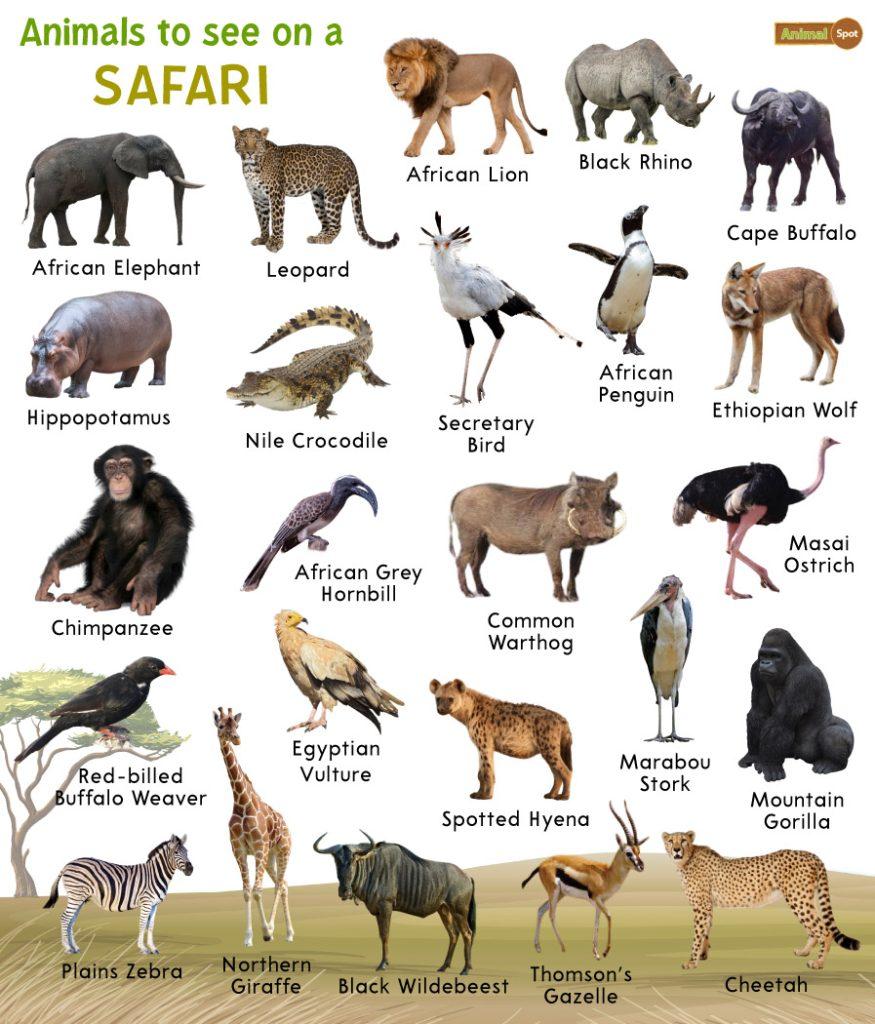
List of Safari Animals
- African Brush-tailed Porcupine
- African Elephant
- African Lion
- African Wild Dog
- Bat-eared Fox
- Black Rhino
- Black Wildebeest
- Black-backed Jackal
- Blue Wildebeest
- Brown Hyena
- Cape Buffalo
- Cape Mountain Leopard
- Common Warthog
- Desert Warthog
- Elephant Shrew
- Ethiopian Wolf
- Giant Pangolin
- Grévy’s Zebra
- Ground Pangolin
- Hippopotamus
- Honey Badger
- Long-tailed Pangolin
- Mountain Gorilla
- Mountain Zebra
- Northern Giraffe
- Plains Zebra
- Riverine Rabbit
- Rothschild’s Giraffe
- Side-striped Jackal
- Spotted Hyena
- Striped Hyena
- Thomson’s Gazelle
- Tree Pangolin
- White Rhino
- African Grey Hornbill
- African Penguin
- Cape Glossy Starling
- Cape Vulture
- Egyptian Vulture
- Grey Crown Crane
- Helmeted Guinea-fowl
- Kori Bustard
- Lesser Flamingo
- Lilac-Breasted Roller
- Malachite Kingfisher
- Marabou Stork
- Masai Ostrich
- Red-billed Buffalo Weaver
- Rüppell’s Vulture
- Saddle Billed Stork
- Secretary Bird
- Southern Masked Weaver Bird
- White-backed Vulture
- White-billed Buffalo Weaver
- White-headed Vulture
- Agama Lizard
- Leopard Tortoise
- Nile Crocodile
Some of the best countries that offer safaris are Kenya, Namibia, Rwanda, South Africa, Tanzania, Uganda, and Zimbabwe.
While the animals are wild and, therefore, can exhibit unpredictable behavior, a guide will be present to provide protection and keep them safe.
Not at all. In fact, they prevent poaching by incentivizing locals to protect endangered species due to the money provided by these safaris.
Recent Wallpapers
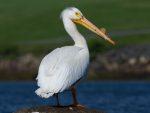
- Invertebrates
Subscribe our newsletter
Follow us on:.
- Privacy Policy
- Animal Habitats
- Animal Memes
© 2024 ( Animal Spot ). All rights reserved. Reproduction in whole or in part without permission is prohibited.
- ABBREVIATIONS
- BIOGRAPHIES
- CALCULATORS
- CONVERSIONS
- DEFINITIONS

Vocabulary
What does safari mean?
Definitions for safari səˈfɑr i sa·far·i, this dictionary definitions page includes all the possible meanings, example usage and translations of the word safari ., princeton's wordnet rate this definition: 0.0 / 0 votes.
campaign, hunting expedition, safari noun
an overland journey by hunters (especially in Africa)
Wiktionary Rate this definition: 5.0 / 1 vote
- safari noun
A trip into any undeveloped area to see, photograph or hunt wild animals in their own environment.
Etymology: From safari, from سفر.
Wikipedia Rate this definition: 0.0 / 0 votes
A safari (; from Swahili safari 'journey originally from the Arabic word 'Safar' meaning 'to journey' ') is an overland journey to observe wild animals, especially in Southeast Africa. The so-called "Big Five" game animals of Africa – lion, leopard, rhinoceros, elephant, and Cape buffalo – particularly form an important part of the safari market, both for wildlife viewing and big-game hunting.
ChatGPT Rate this definition: 0.0 / 0 votes
A safari is an expedition or journey, usually into natural environments such as forests, jungles or plains, especially in Africa, with the purpose of observing wildlife in their natural habitat. The term is also used to refer to other types of adventurous journeys or explorations. Safari can also refer to a web browser developed by Apple Inc.
Wikidata Rate this definition: 0.0 / 0 votes
Safari is a web browser developed by Apple Inc. and included with the Mac OS X and iOS operating systems. First released as a public beta on January 7, 2003 on the company's OS X operating system, it became Apple's default browser beginning with Mac OS X v10.3 "Panther". Safari is also the native browser for iOS. A version of Safari for the Microsoft Windows operating system was first released on June 11, 2007, and supported Windows XP Service Pack 2, or later but it has been discontinued. Safari 5.1.7, released on May 9, 2012, is the last version available for Windows. According to Net Applications, Safari accounted for 62.17 percent of mobile web browsing traffic and 5.43 percent of desktop traffic in October 2011, giving a combined market share of 8.72 percent.
Surnames Frequency by Census Records Rate this definition: 0.0 / 0 votes
According to the U.S. Census Bureau, Safari is ranked #59324 in terms of the most common surnames in America. The Safari surname appeared 341 times in the 2010 census and if you were to sample 100,000 people in the United States, approximately 0 would have the surname Safari . 68.9% or 235 total occurrences were White . 15.2% or 52 total occurrences were Black . 11.7% or 40 total occurrences were of two or more races . 2.3% or 8 total occurrences were of Hispanic origin.
Matched Categories
Usage in printed sources from: .
[["1655","1"],["1685","1"],["1689","1"],["1700","1"],["1703","1"],["1720","1"],["1722","2"],["1723","1"],["1730","1"],["1734","1"],["1735","1"],["1748","1"],["1754","1"],["1757","1"],["1765","1"],["1769","1"],["1772","1"],["1774","1"],["1780","2"],["1782","2"],["1787","2"],["1791","1"],["1792","1"],["1793","1"],["1797","1"],["1798","1"],["1808","1"],["1813","1"],["1815","1"],["1817","1"],["1820","1"],["1822","1"],["1823","1"],["1825","1"],["1830","1"],["1832","1"],["1834","1"],["1837","1"],["1838","1"],["1839","1"],["1840","4"],["1842","1"],["1843","1"],["1845","1"],["1846","1"],["1848","1"],["1850","1"],["1854","5"],["1857","1"],["1858","1"],["1860","3"],["1864","1"],["1866","2"],["1868","1"],["1869","2"],["1873","1"],["1874","15"],["1875","16"],["1876","3"],["1881","2"],["1883","1"],["1885","2"],["1888","2"],["1889","4"],["1890","17"],["1891","17"],["1892","327"],["1893","118"],["1894","20"],["1896","7"],["1897","6"],["1898","42"],["1899","11"],["1900","12"],["1901","4"],["1902","1"],["1903","170"],["1904","131"],["1905","10"],["1906","26"],["1907","18"],["1908","148"],["1909","490"],["1910","2004"],["1911","291"],["1912","413"],["1913","565"],["1914","267"],["1915","513"],["1916","566"],["1917","164"],["1918","269"],["1919","148"],["1920","94"],["1921","127"],["1922","371"],["1923","445"],["1924","472"],["1925","376"],["1926","404"],["1927","380"],["1928","447"],["1929","718"],["1930","559"],["1931","450"],["1932","255"],["1933","287"],["1934","183"],["1935","289"],["1936","562"],["1937","371"],["1938","1600"],["1939","188"],["1940","470"],["1941","267"],["1942","237"],["1943","109"],["1944","254"],["1945","193"],["1946","520"],["1947","327"],["1948","245"],["1949","235"],["1950","359"],["1951","394"],["1952","369"],["1953","446"],["1954","1283"],["1955","964"],["1956","719"],["1957","686"],["1958","729"],["1959","1632"],["1960","1054"],["1961","1138"],["1962","1565"],["1963","1520"],["1964","1214"],["1965","1185"],["1966","1303"],["1967","1407"],["1968","1587"],["1969","1608"],["1970","1557"],["1971","1530"],["1972","1618"],["1973","1756"],["1974","2171"],["1975","1399"],["1976","1815"],["1977","1979"],["1978","1750"],["1979","2345"],["1980","1901"],["1981","1828"],["1982","1859"],["1983","2447"],["1984","3044"],["1985","2465"],["1986","2555"],["1987","3708"],["1988","3751"],["1989","3887"],["1990","5842"],["1991","4661"],["1992","4647"],["1993","5252"],["1994","5229"],["1995","5624"],["1996","5099"],["1997","5788"],["1998","6178"],["1999","7562"],["2000","7707"],["2001","7980"],["2002","8947"],["2003","9257"],["2004","10009"],["2005","10441"],["2006","11608"],["2007","10204"],["2008","10482"]]
How to pronounce safari?
Alex US English David US English Mark US English Daniel British Libby British Mia British Karen Australian Hayley Australian Natasha Australian Veena Indian Priya Indian Neerja Indian Zira US English Oliver British Wendy British Fred US English Tessa South African
How to say safari in sign language?
Chaldean Numerology
The numerical value of safari in Chaldean Numerology is: 7
Pythagorean Numerology
The numerical value of safari in Pythagorean Numerology is: 9
Examples of safari in a Sentence
Andrew Schneider :
Marriage. It's a hard term to define. Especially for me--I've ducked it like root canal. Still there's no denying the fact that marriage ranks right up there with birth and death as one of the three biggies in the human safari . It's the only one though that we'll celebrate with a conscious awareness. Very few of you remember your arrival and even fewer of you will attend your own funeral.
J. G. Ballard :
Pop artists deal with the lowly trivia of possessions and equipment that the present generation is lugging along with it on its safari into the future.
W. C. Fields :
Reminds me of my safari in Africa. Somebody forgot the corkscrew and for several days we had to live on nothing but food and water.
Philip Muruthi :
In Kenya, for example, contact the Kenya Professional Safari Guides Association.
Josef Woodman :
South Africa pioneered an approach of allowing patrons from Beverley Hills or London to sneak off for 'surgery and safari ,' they could have a nose job and stay for 30 days.
Popularity rank by frequency of use
- ^ Princeton's WordNet http://wordnetweb.princeton.edu/perl/webwn?s=safari
- ^ Wiktionary https://en.wiktionary.org/wiki/Safari
- ^ Wikipedia https://en.wikipedia.org/wiki/Safari
- ^ ChatGPT https://chat.openai.com
- ^ Wikidata https://www.wikidata.org/w/index.php?search=safari
- ^ Surnames Frequency by Census Records https://www.census.gov/topics/population/genealogy/data/2010_surnames.html
- ^ Usage in printed sources https://books.google.com/ngrams/graph?content=safari
Word of the Day
Would you like us to send you a free new word definition delivered to your inbox daily.
Please enter your email address:
Citation
Use the citation below to add this definition to your bibliography:.
Style: MLA Chicago APA
"safari." Definitions.net. STANDS4 LLC, 2024. Web. 22 Sep. 2024. < https://www.definitions.net/definition/safari >.
Discuss these safari definitions with the community:
Report Comment
We're doing our best to make sure our content is useful, accurate and safe. If by any chance you spot an inappropriate comment while navigating through our website please use this form to let us know, and we'll take care of it shortly.
You need to be logged in to favorite .
Create a new account.
Your name: * Required
Your email address: * Required
Pick a user name: * Required
Username: * Required
Password: * Required
Forgot your password? Retrieve it
Are we missing a good definition for safari ? Don't keep it to yourself...
Image credit, the web's largest resource for, definitions & translations, a member of the stands4 network, image or illustration of.

Free, no signup required :
Add to chrome, add to firefox, browse definitions.net, are you a words master, pass through the tissue or substance or its pores or interstices, as of gas, Nearby & related entries:.
- safaqis noun
- safaree samuels
- safari 3000
- safari jacket
- safari park noun
- safari shirt
- safari song
Alternative searches for safari :
- Search for safari on Amazon

Synonyms of safari
- More from M-W
- To save this word, you'll need to log in. Log In
Thesaurus Definition of safari
Synonyms & Similar Words
- peregrination
- commutation
Examples of safari in a Sentence
These examples are programmatically compiled from various online sources to illustrate current usage of the word 'safari.' Any opinions expressed in the examples do not represent those of Merriam-Webster or its editors. Send us feedback about these examples.
Thesaurus Entries Near safari
Cite this entry.
“Safari.” Merriam-Webster.com Thesaurus , Merriam-Webster, https://www.merriam-webster.com/thesaurus/safari. Accessed 22 Sep. 2024.
More from Merriam-Webster on safari
Nglish: Translation of safari for Spanish Speakers
Britannica.com: Encyclopedia article about safari
Subscribe to America's largest dictionary and get thousands more definitions and advanced search—ad free!

Can you solve 4 words at once?
Word of the day.
See Definitions and Examples »
Get Word of the Day daily email!
Popular in Grammar & Usage
Every letter is silent, sometimes: a-z list of examples, plural and possessive names: a guide, the difference between 'i.e.' and 'e.g.', more commonly misspelled words, absent letters that are heard anyway, popular in wordplay, weird words for autumn time, much ado about ‘folie à deux’, 10 words from taylor swift songs (merriam's version), 9 superb owl words, 15 words that used to mean something different, games & quizzes.

- Daily Crossword
- Word Puzzle
- Word Finder
- Word of the Day
- Synonym of the Day
- Word of the Year
- Language stories
- All featured
- Gender and sexuality
- All pop culture
- Writing hub
- Grammar essentials
- Commonly confused
- All writing tips
- Pop culture
- Writing tips
Advertisement
[ s uh - fahr -ee ]
- a journey or expedition, for hunting, exploration, or investigation, especially in eastern Africa.
- the hunters, guides, vehicles, equipment, etc., forming such an expedition.
- any long or adventurous journey or expedition.
verb (used without object)
- to go on a safari.
/ səˈfɑːrɪ /
- an overland journey or hunting expedition, esp in Africa
- any recreational journey or expedition
- the people, animals, etc, that go on the expedition
Word History and Origins
Origin of safari 1
Example Sentences
One of the earliest ticker-tape parades was for Teddy Roosevelt when he returned from an African safari in 1910.
But he fell out of favour when it was revealed he had been on a big-game hunting safari.
A mere 800 travelers are allowed to visit the northern area of the park each year through safari tours, and prices are steep.
Would William support a hunting safari in Africa, whose supporters often make the very same arguments?
Earlier this month the two truly got away from it all when they went on an African safari with Eugenie and her boyfriend.
You start on safari to the railway as soon as possible, or sooner.
They set out on a leisurely return to the little safari, accompanied for a few miles by the soldierly Zulus.
A little after noon as they neared the safari they came upon a village which was in great excitement.
The next morning the safari filed out from the camp, the Masai greeting the inspanning with huge delight.
"Safari" is itself a Swahili word of Arabic origin, meaning an expedition and all that pertains to it.
Related Words

IMAGES
VIDEO
COMMENTS
The meaning of SAFARI is the caravan and equipment of a hunting expedition especially in eastern Africa; also : such a hunting expedition. How to use safari in a sentence.
Hot Air Balloon Safari. For those looking for a truly unique experience, a hot air balloon safari may be just the thing. These safaris offer a bird's-eye view of the landscape and wildlife below, providing a different perspective than a ground-based safari. Hot air balloon safaris are typically conducted early in the morning when the air is ...
The word "safari" itself comes from Swahili - the main language of the people of East Africa. It means "journey, trip" and goes back to the Arabic word "safar" with the same meaning. In Swahili-speaking countries, the term refers to any journey. There is even a common phrase, safari njema! It is a wish for a good and pleasant journey.
SAFARI definition: 1. an organized journey to look at, or sometimes hunt, wild animals, especially in Africa: 2. an…. Learn more.
In Africa, a holiday only becomes a safari when you add an element of wildlife watching in nature. Be it game viewing by 4x4 safari vehicle, boat, canoe, small plane, or on foot, to name a few. Based on this broader definition of safari, boat trips and marine tours are often classed as 'ocean safaris'. Walking safari with giraffe
Photographic safari in Sabi Sands Game Reserve, South Africa. A safari (/ s ə ˈ f ɑːr i /; from Swahili safari 'journey' originally from Arabic Safar 'to journey') is an overland journey to observe wild animals, especially in East Africa. [1] [2] [3] The so-called "Big Five" game animals of Africa - lion, leopard, rhinoceros, elephant, and Cape buffalo - particularly form an important ...
This is African safari, an evocative immersion in the wild world, an intimate insight into a wilderness that hasn't been tamed. The best way to think about it is to consider the etymology of safari. It's a Swahili word meaning "journey" and journey is the only adequate descriptive for the experience. It's a journey that connects you ...
Safari definition: a journey or expedition, for hunting, exploration, or investigation, especially in eastern Africa.. See examples of SAFARI used in a sentence.
An African safari is all this and so much more. You'll be immersed in the wilderness, connecting with all your senses. The journey has already started. Keep reading as this page provides all the essential information about a safari. Hint: it's nothing like a zoo. In Africa, you're going into the wild. An introduction to safari. Safari ...
African wildlife safari companies stuff you with food, so plan on dieting when you get home. Around 20:00 marks dinner time. Sometimes, dinners are in a communal setting, or sometimes, you'll enjoy a private dinner with your party. Dinners are often served with bottomless wine or three or five-course.
1860s. The earliest known use of the noun safari is in the 1860s. OED's earliest evidence for safari is from 1860, in a paper by Richard Burton, explorer and author. safari is a borrowing from Swahili. Etymons: Swahili safari.
WHAT. "African safari is an expedition or a trip, usually by tourists, to observe animals in their natural habitat.". These natural habitats can be national parks or game reserves such as Kruger national park in South Africa, Masai Mara in Kenya, and Serengeti in Tanzania. For the sake of basic understanding, I will limit my examples to ...
Practically speaking, an African safari is a vacation or tour to a wildlife reserve in an African country for the purposes of seeing and photographing a range of wildlife in their natural habitat, in order to observe their natural way of life. African safaris are about immersing oneself in nature and observing wildlife go about their daily life ...
Today's safari is a sightseeing trip to a national park in Africa with the primary goal of seeing wildlife. Safaris used to be planned with the intention of hunting big game. The traditional Big Five of Africa—the elephant, lion, rhino, African buffalo, and leopard—are connected to the continent's hunting customs.
Definition of safari noun in Oxford Advanced American Dictionary. Meaning, pronunciation, picture, example sentences, grammar, usage notes, synonyms and more.
Conservancy: Conservancies are designated areas of a national park or other public reserves that are privately maintained to manage and preserve wildlife and the environment. Dorp: Commonly used in South Africa, dorp refers to a small rural town or village. Dry Season: Also known as peak or high season, dry season in safari terms refers to the dry winter months of a destination where animals ...
The meaning of safari. Definition of safari. Best online English dictionaries for children, with kid-friendly definitions, integrated thesaurus for kids, images, and animations. Spanish and Chinese language support available
The project retains aspects of the hunting experience—guests jump out of a jeep to track animals on foot, wade into rivers, and scale ridges to observe herds of buffalo—but the only shooting ...
Arguably, the most popular destination for enthusiasts to go on a safari is Africa, notably Kenya and East Africa, due to the fauna the continent is home to. For instance, the "Big 5" was a designation given to five animals by hunters due to the difficulty involved in hunting them.
• Tea is brought by a small furtive man in a grey safari suit. • For an additional £145 visitors can opt to vacate their hotel rooms for a two-night safari. • All Sovereign clients are guaranteed a window seat on our safari bus. • I suppose because photographic safaris are great for you and me, but they feel kind of lame to a born hunter.
Definition of safari in the Definitions.net dictionary. Meaning of safari. Information and translations of safari in the most comprehensive dictionary definitions resource on the web.
Synonyms for SAFARI: tour, trip, pilgrimage, expedition, flight, trek, odyssey, quest, journey, cruise
Safari definition: . See examples of SAFARI used in a sentence.
Amara, an 800 kg southern white rhino at a safari park in northwest England, has received what has been described as a "groundbreaking" medical operation to help heal a broken front leg.